
Google’s Helpful Content updates have hit travel publishers hard. It’s something I talk about in my guide to SEO for travel websites.
In fact, many sites that have historically thrived on the SERPs are now nowhere to be found. I’m talking about drops in organic traffic of 90% or more.
To understand the true impact that the HCU has had on travel publishers, I’ve analysed how 671 sites have performed since the update first rolled out in August 2022 and following each subsequent refresh.
In this study, you’ll see how the HCU has impacted a lot of travel publishers and bloggers who, quite honestly, didn’t deserve to experience such a rapid decline in visibility. Sites that have been doing their thing for many years have been producing content that’s a lot better than what now ranks, and have clearly fallen foul of an algorithm that’s about more than just ‘helpful content.’
The findings tell an interesting story if not one of concern for the future of those bloggers and publishers who have historically brought an independent view of destinations, things to do and places to stay.
You’ll gain an insight into how the HCU has impacted travel publishers:
- The winners and the losers of the updates.
- The average impact on traffic, keyword visibility and top 3 rankings since launch, including a detailed analysis of each refresh.
- Trends seen across the winners and losers of the HCU, including a summary of the key factors that the updates look to target.
There’s no ignoring the fact that travel publishers have seen some of the biggest losses in the fallout from the HCU, but I think you’ll be shocked at the extent to which this has happened.
Using a combination of sites listed on Niche Site Metrics and manual searches, I compiled a list of 750 travel publishers. For each site, organic traffic, the total number of keywords the site ranks for and the number of keywords ranking in positions 1 to 3 were obtained using the Ahrefs API got four different periods:
– August 2022
– December 2022
– August 2023
– May 2024
These dates coincide with the period just before the following Helpful Content Updates:
– March 2024 Core Update (Bringing in the Helpful Content Update)
– September 2023 Helpful Content Update
– December 2022 Helpful Content Update
– August 2022 Helpful Content Update
Following the collection of the data for each period, any sites with less than estimated organic traffic of less than 5,000 per month were excluded from the list. This typically indicated a new site that would not be affected by the HCU due to the recency of launch. To allow a fair comparison of the impact across the sites in the study, these sites were excluded based on this traffic threshold.
This left a total of 671 travel publishers from which data was analysed.
Google’s HCU vs travel publishers
Between the launch of the Helpful Content Update in August 2022 and the most recent refresh of this as part of the March 2024 Core Update, 78% of the 671 travel publishers that I analysed lost organic traffic.
That’s 8 in 10 sites.
This is huge and, in my opinion, such a blow to many of these sites that spent years establishing themselves as a real source of travel inspiration and recommendations.
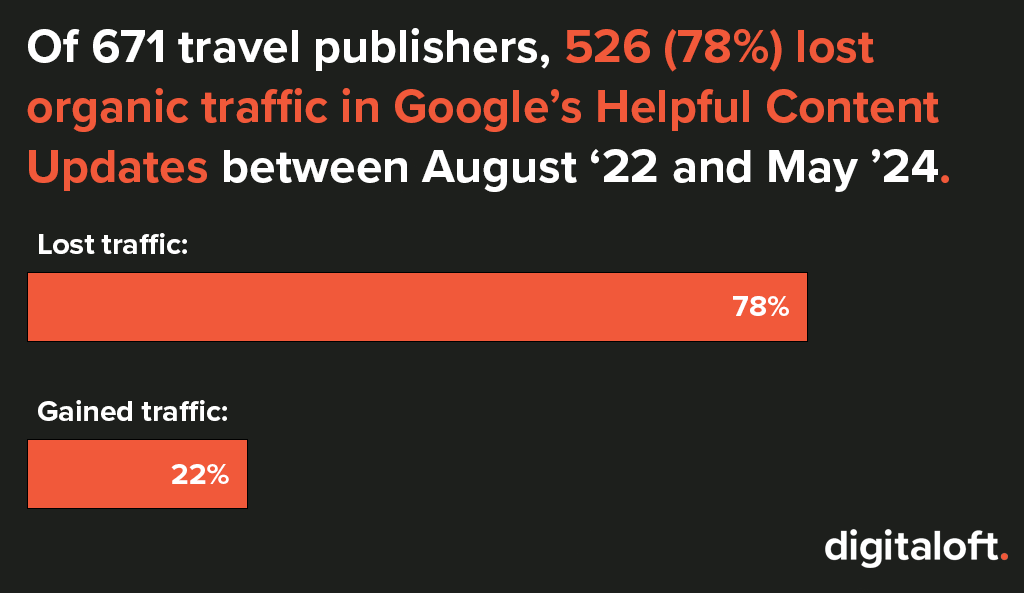
But let’s quickly break down at what Google initially said when launching the Helpful Content Update back in August 2022:
We’re launching what we’re calling the “helpful content update” that’s part of a broader effort to ensure people see more original, helpful content written by people, for people, in search results.
Google, August ’22
This kinda makes sense. We’ve all seen a huge rise in the volumes of AI-generated content littering the web over the last few years, and I don’t believe for a minute that this type of mass-produced content should be ranking at the top of the SERPs.
AI can’t replace a human’s experience, and when we’re talking about travel publishers, it’s only common sense that Google would reward content that has been created by humans rather than machines. After all, surely we’d all sooner listen to recommendations of places to go, places to stay or things to do from people who have actually know these destinations inside out, rather than having just rewritten what another site says?
I can get on board with this, at least in principle.
But what did Google say about creating helpful content?
How can you ensure you’re creating content that will be successful with our new update? By following our long-standing advice and guidelines to create content for people, not for search engines. People-first content creators focus first on creating satisfying content, while also utilizing SEO best practices to bring searchers additional value.
Google, August ’22
Back in August 2022, Google clearly stated that content should be created for people, not for search engines. Which again, in principle I’m on board with.
But this is where the interpretations of this likely differ.
To me, this means what ‘creating great content’ has meant for a long time:
- Answering the query that’s being searched for
- Getting to the point of the content, not waffling on for the sake of it
- Avoiding keyword stuffing and over-optimisation
You know, creating content that’s easy to consume and that reads like it’s actually been written by a human, not a robot?
And Google’s definition does indicate this, referencing that people-first content creators focus first on creating satisfying content.
There’s then the note of ‘also utilizing SEO best practices to bring searchers additional value.’
If I’m a travel publisher, writing a guide to “the best things to do in Dubai with kids” is about creating the content that the audience wants.
If I’m heading away to Dubai with my kids, I’m going to search like this. And I want to find content that gives an opinion into the best things to do whilst I’m there, not just a list of attractions I can buy tickets for.
I want to discover the hidden gems, those things that me and the kids will enjoy, that aren’t always busy and over-priced commercial attractions, and things that let us enjoy the culture of the place we’re visiting. That might not be a ‘ticketed’ attraction. It might be a landmark to go see, somewhere to watch the sunset from. It could be one of many things.
As a content consumer, I want to see the content being produced by bloggers. So long, of course, that this aligns with the basic principles of E-E-A-T. I’m a big advocate of this, and fully support a web where the content that is surfaced the most is that which has been produced by people with the relevant experience and/or expertise.
I guess you could say I’m against sites ranking for things they don’t deserve to rank for.
Let’s keep looking at Google’s HCU announcement. The questions they recommend asking yourself about your content to make sure it’s people-first:
- Do you have an existing or intended audience for your business or site that would find the content useful if they came directly to you?
- Does your content clearly demonstrate first-hand expertise and a depth of knowledge (for example, expertise that comes from having actually used a product or service, or visiting a place)?
- Does your site have a primary purpose or focus?
- After reading your content, will someone leave feeling they’ve learned enough about a topic to help achieve their goal?
- Will someone reading your content leave feeling like they’ve had a satisfying experience?
- Are you keeping in mind our guidance for core updates and for product reviews?
Again, I can get on board with these questions, and would agree that answering yes to these is a good indicator of helpful content.
And on the flip of it, the questions that Google suggests you ask to ensure you’re not creating “search-engine first content:”
- Is the content primarily to attract people from search engines, rather than made for humans?
- Are you producing lots of content on different topics in hopes that some of it might perform well in search results?
- Are you using extensive automation to produce content on many topics?
- Are you mainly summarizing what others have to say without adding much value?
- Are you writing about things simply because they seem trending and not because you’d write about them otherwise for your existing audience?
- Does your content leave readers feeling like they need to search again to get better information from other sources?
- Are you writing to a particular word count because you’ve heard or read that Google has a preferred word count? (No, we don’t).
- Did you decide to enter some niche topic area without any real expertise, but instead mainly because you thought you’d get search traffic?
- Does your content promise to answer a question that actually has no answer, such as suggesting there’s a release date for a product, movie, or TV show when one isn’t confirmed?
This is where I start to struggle a bit.
Some of these are very ambiguous.
Search engines are a platform for humans to discover content that matches the intent of their search. And if search engines are one of the primary traffic acquisition channels a publisher has pursued, that doesn’t mean the content isn’t made for humans.
Content can be optimised to be found on search engines while primarily written for humans. Of course, it can. It would be ridiculous to suggest otherwise.
Producing content on different topics and hoping some might perform well? I get this; stop spamming (unless there’s a genuine reason for doing this; national newspapers for example).
Automation; again I’m fully on board here. Mass generated content is often just spam.
In terms of adding value, this should be the foundation of great content and something I’ve been saying for years. Stop producing copycat content that simply rehashes what already ranks. Why would Google rank your content over what’s already out there?
I could keep going, but it’s getting boring, right?
These are just the fundamentals of creating great content. In my opinion, these things aren’t exclusive to Google. They’re just the foundations of what content that deserves to rank at the top of the SERPs is. But that shouldn’t be anything new.
And this is where I really start to doubt that the HCU is just about ‘helpful content.’ It’s way too subjective, and it means different things to different people.
And when you hear that 32% (213) of the sites I analysed lost more than 90% of their organic traffic in the HCU, this looks even more likely.
We’re talking sites that have basically been obliterated, here. Sites that used to enjoy millions of sessions every month being reduced to pretty much nothing. Sites that many people have spent many, many hours working on.
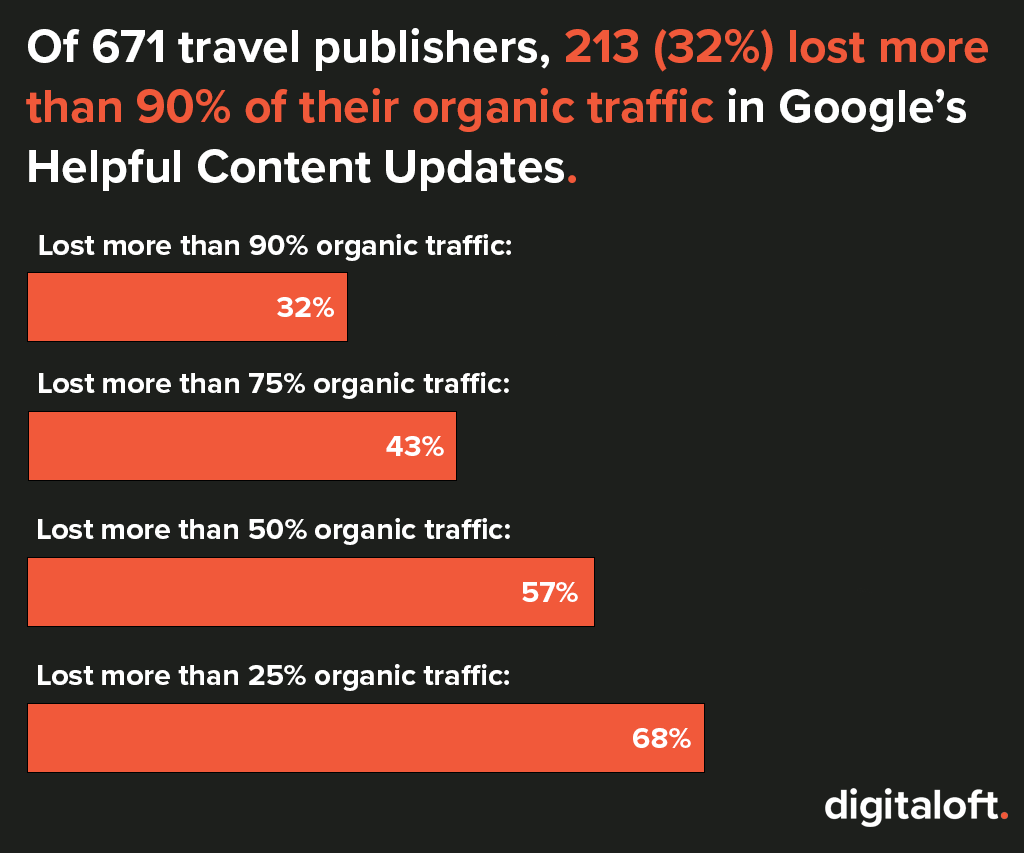
The reality is that most of these sites aren’t AI-generated spam. If they were, I’d be cheering from the rooftops. It would mean that Google’s goal of cleaning up unhelpful content was achieved.
Instead, they’re sites with lots and lots of content that I, and many other content consumers, would regard as incredibly helpful.
Content like this guide from Upgraded Points that looks at the best websites for booking flights:
Just look how the page’s traffic has tanked over the last few years:

Back in August ’22, this page ranked #1 for ‘best flight website.’
And whilst we could maybe suspect that the type of content that ranks for this query has changed, it’s now Nerdwallet that ranks #2 (Kayak ranks #1, but I’d argue this isn’t the right type of result; people want to compare the different websites, not be served one of the flight sites), and Upgraded Points’ page has dropped to #12.
There have been some success stories through the HCU, though. Just it’s a much smaller number of sites that saw growth in organic traffic than those that saw big losses.
Of the 671 travel publishers I analysed, just 12% (83 sites) experienced more than 50% growth between August ‘22 and May ‘24.
Whilst there’s no getting away from the fact that, for some, 50% growth in three years is big, when we consider that less than a quarter of the 671 sites saw any level of growth, and over 75% saw losses, we can easily see the bigger picture on what’s happened.
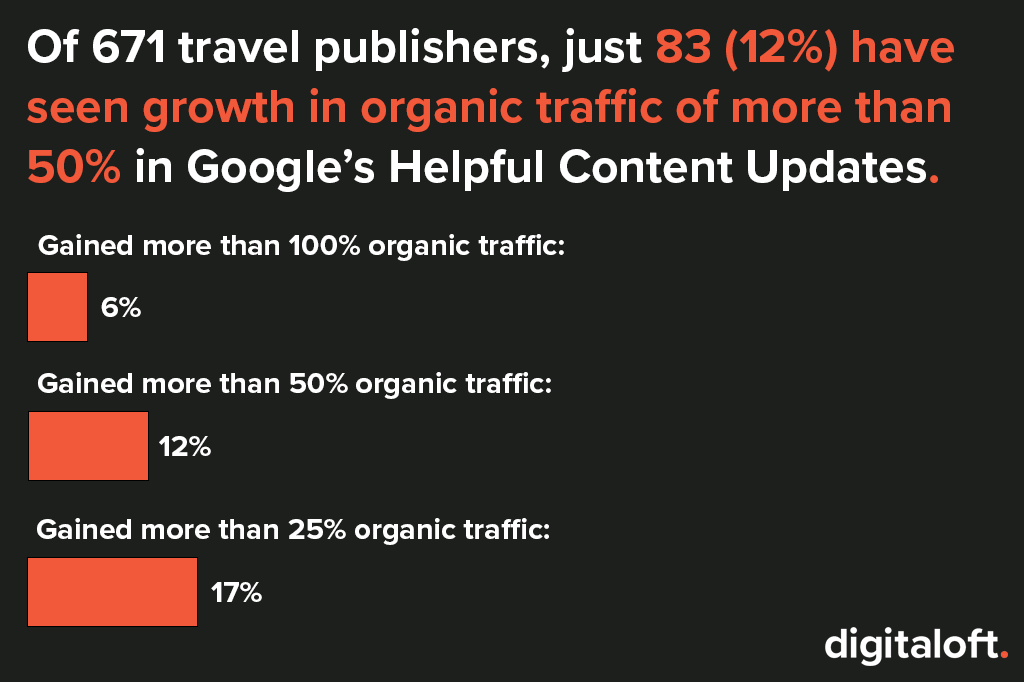
The travel publishers that gained the most organic traffic in the HCU
Let’s start by looking at the 25 travel publishers who gained the most organic traffic in the HCU.
This list pretty much aligns with the type of sites you’d expect to see, following all the talk of the updates rewarding ‘big brands,’ but there are definitely some surprises in here, too.
In all honesty, when someone loses traffic and visibility, someone else has to gain it. There’s no denying that many of the publishers here are great resources who deserve the traffic they’ve earned.
| URL | Gained Organic Sessions p/m (Aug ’22 to May ’24) | % of Traffic Gained |
|---|---|---|
| timeout.com | +4,209,736 | 56% |
| lonelyplanet.com | +2,038,544 | 133% |
| travelweekly.com | +1,421,731 | 207% |
| fodors.com | +1,243,135 | 309% |
| cruisecritic.com | +956,920 | 110% |
| travelandleisure.com | +844,984 | 27% |
| cntraveller.com | +621,322 | 80% |
| atlasobscura.com | +605,300 | 54% |
| flyertalk.com | +447,822 | 471% |
| secretnyc.co | +373,758 | 294% |
| afar.com | +321,107 | 63% |
| wdwmagic.com | +240,910 | 279% |
| 6amcity.com | +234,191 | 350% |
| frommers.com | +221,114 | 63% |
| thepointsguy.com | +200,240 | 10% |
| touringplans.com | +197,809 | 107% |
| mickeyvisit.com | +149,325 | 307% |
| forbestravelguide.com | +129,364 | 87% |
| thetravel.com | +116,484 | 43% |
| savannahfirsttimer.com | +104,773 | 1363% |
| journeyera.com | +101,586 | 149% |
| onemileatatime.com | +99,699 | 51% |
| secretldn.com | +93,953 | 22% |
| australianfrequentflyer.com.au | +86,086 | 357% |
| cruise.blog | +68,578 | 155% |
But honestly, the real insights come when we look at those who lost traffic. My feeling is that, at least in many cases, these winners won because they took the place of multiple sites that lost. That’s just how search works.
The travel publishers that lost the most organic traffic in the HCU
Just a heads up. There are some big surprises here.
Whilst there’s plenty of talk on Twitter (X), especially about big brand publishers totally owning the SERPs following the HCU, there are some big names in here. At least big-name travel publishers and ones that have spent years building up a reputation as such.
Let’s say that some of the sites on this list really surprised me:
| URL | Lost Organic Sessions p/m (Aug ’22 to May ’24) | % of Traffic Lost |
|---|---|---|
| planetware.com | -3,601,418 | -89% |
| theculturetrip.com | -2,328,177 | -69% |
| thrillist.com | -2,136,646 | -68% |
| thecrazytourist.com | -1,842,296 | -98% |
| tripsavvy.com | -1,344,146 | -57% |
| trip101.com | -899,166 | -91% |
| touropia.com | -557,752 | -73% |
| viatravelers.com | -349,624 | -99% |
| bucketlistjourney.net | -338,767 | -81% |
| travelawaits.com | -330,041 | -67% |
| upgradedpoints.com | -329,281 | -33% |
| travelfashiongirl.com | -314,334 | -88% |
| theplanetd.com | -291,584 | -64% |
| travellemming.com | -279,585 | -90% |
| routinelynomadic.com | -235,162 | -81% |
| handluggageonly.co.uk | -230,261 | -54% |
| wdwnt.com | -216,890 | -62% |
| earthtrekkers.com | -209,174 | -38% |
| thebrokebackpacker.com | -202,093 | -45% |
| swedishnomad.com | -200,431 | -78% |
| expertworldtravel.com | -193,331 | -94% |
| uncovercolorado.com | -191,235 | -51% |
| smartertravel.com | -189,943 | -60% |
| getawaycouple.com | -178,250 | -100% |
| theworldpursuit.com | -170,503 | -98% |
Some of these publications are ones that, as a digital PR agency, we’ve shouted about when our clients have been featured on there (The Culture Trip, Thrillist and TripSavvy, I’m looking at you). We’ve seen these publishers’ logos featured on our clients’ homepages as authoritative publications who have talked about their brand.
Ask one of our digital PR team to name ten travel publications that drive the most engagement and/or referral traffic to clients featured on them, at I can guarantee that at least a couple of these sites would be on there.
Once again, I encourage you to ask yourself the question, “is this really about helpful content?”
You see, the definition of ‘helpful’ is massively subjective. And what one person finds helpful isn’t going to be the same as what someone else does. This is based on what they’re searching, what they’re expecting, their prior level of knowledge on a topic and many more factors.
I don’t believe for a minute that we should be trying to shoehorn the definition of ‘helpful content’ into a checklist. It’s impossible.
And even when we get onto the topic of ads, and the fact that many publishers monetise this way, it’s still so subjective.
Personally, I find too many ads annoying. Yes, it’s not great for user experience. But I’d sure as hell prefer to consume content that’s on a page with ads than log in to, or pay for, content that’s behind a paywall. And I’m sure I’m not alone in this preference.
I’m sorry, but many of the sites on this list simply didn’t deserve to lose hundreds of thousands of visitors each month.
And before we get into the debate about ‘niche sites’ not being brands, and this being what Google is now rewarding, let’s step back to The Culture Trip, Thrillist and TripSavvy.
In fact, no. Let’s go one better.
Here are the social followings and monthly branded searches on Google for all 25 of these sites:
| URL | Instagram Followers | Facebook Followers | Brand Searches p/m |
|---|---|---|---|
| planetware.com | 578 | 7,000 | 320 |
| theculturetrip.com | 634,000 | 7.2 million | 1,900 |
| thrillist.com | 850,000 | 5.4 million | 8,100 |
| thecrazytourist.com | 5,928 | 227,000 | 170 |
| tripsavvy.com | 591,000 | 90,000 | 880 |
| trip101.com | 3,959 | 84,000 | 30 |
| touropia.com | N/A | N/A | 390 |
| viatravelers.com | 4,371 | 36,000 | 140 |
| bucketlistjourney.net | 100,000 | 21,000 | 30 |
| travelawaits.com | 94,200 | 69,000 | 210 |
| upgradedpoints.com | 138,000 | 68,000 | 1,000 |
| travelfashiongirl.com | 32,800 | 57,700 | 320 |
| theplanetd.com | 195,000 | 189,000 | 140 |
| travellemming.com | 44,600 | 22,000 | 320 |
| routinelynomadic.com | 4,037 | 559 | 20 |
| handluggageonly.co.uk | 355,000 | 561,000 | 480 |
| wdwnt.com | 428,000 | 326,000 | 22,000 |
| earthtrekkers.com | 22,300 | 21,000 | 1,000 |
| thebrokebackpacker.com | 8,989 | 41,000 | 170 |
| swedishnomad.com | 112,000 | 93,000 | 20 |
| expertworldtravel.com | N/A | 878 | 20 |
| uncovercolorado.com | 3,540 | 29,000 | 140 |
| smartertravel.com | 48,800 | 148,000 | 1,900 |
| getawaycouple.com | 23,500 | 10,000 | 210 |
| theworldpursuit.com | 133,000 | 118,000 | 50 |
Of course, some of these publishers have pretty much no social following and no branded searches. And it’s maybe no coincidence that some of these sites are also those that I’d probably argue aren’t really producing helpful content.
But it’s those with tens and hundreds of thousands of social followers, some as many as millions, that really confuse things here.
If these publishers were ‘creating content just for search, not humans’, then there wouldn’t be these levels of followings.
Nor would there be thousands of engagements on their content on these platforms:
It seems pretty clear to me that measuring ‘content helpfulness’ isn’t as easy as Google maybe thought it was. There are many things wrong with these updates, and whilst there are definitely sites that deserved to get hit, many more didn’t.
That doesn’t mean, though, that there aren’t things we can spot between the sites that got hit and the sites that didn’t. At least to the extent of having a suspicion on what’s happening.
Side by side: a site that gained and a site that lost organic traffic in the HCU
Having spent a lot of time over the last few months and weeks digging specifically into the impact of the HCU on travel publishers, I’m starting to build up a bit of a theory about what’s happened. And why some sites got hit, and why others didn’t.
But we need to remember that algorithms are never black and white, and there are outliers in this theory.
The reality is that there is always going to be sites that don’t fit the mould, as it were. Sites that didn’t get hit by the HCU which, on the face of it, should have done. Or sites that did get hit but didn’t deserve it.
What we can, and should, do though, is look for trends. Things that are far more obvious across those that got hit and those that didn’t.
And whilst I’d never recommend drawing conclusions from small sample sizes, especially in SEO where there can be multiple factors at play, reverse engineering those who win during algorithm updates and those who don’t is something that can help us to form theories on things that could contribute to a site being impacted or not.
Let’s look at two publishers; one that got hit in the HCU and one that didn’t… Thrillist (negative organic visibility) and Afar (positive organic visibility).
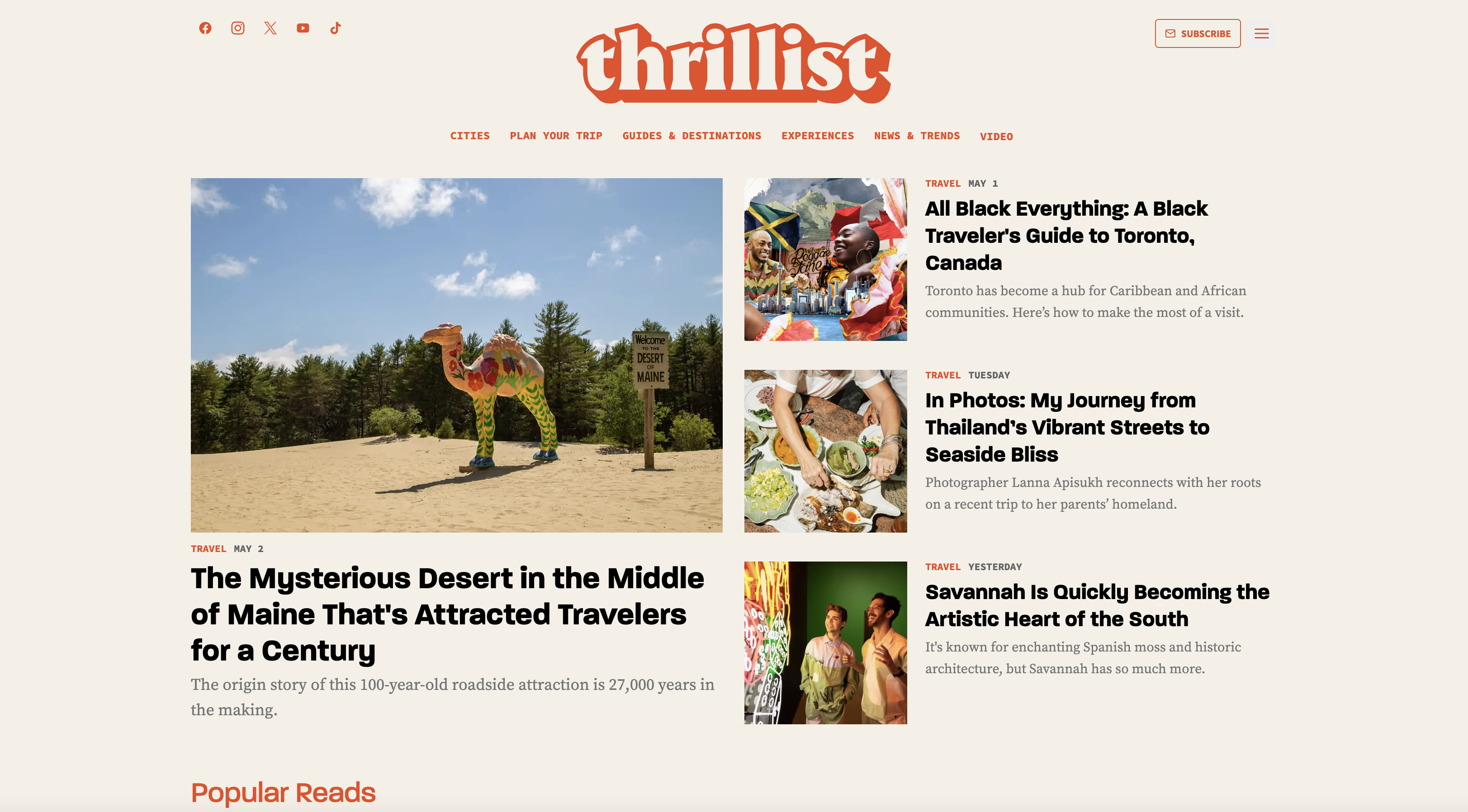
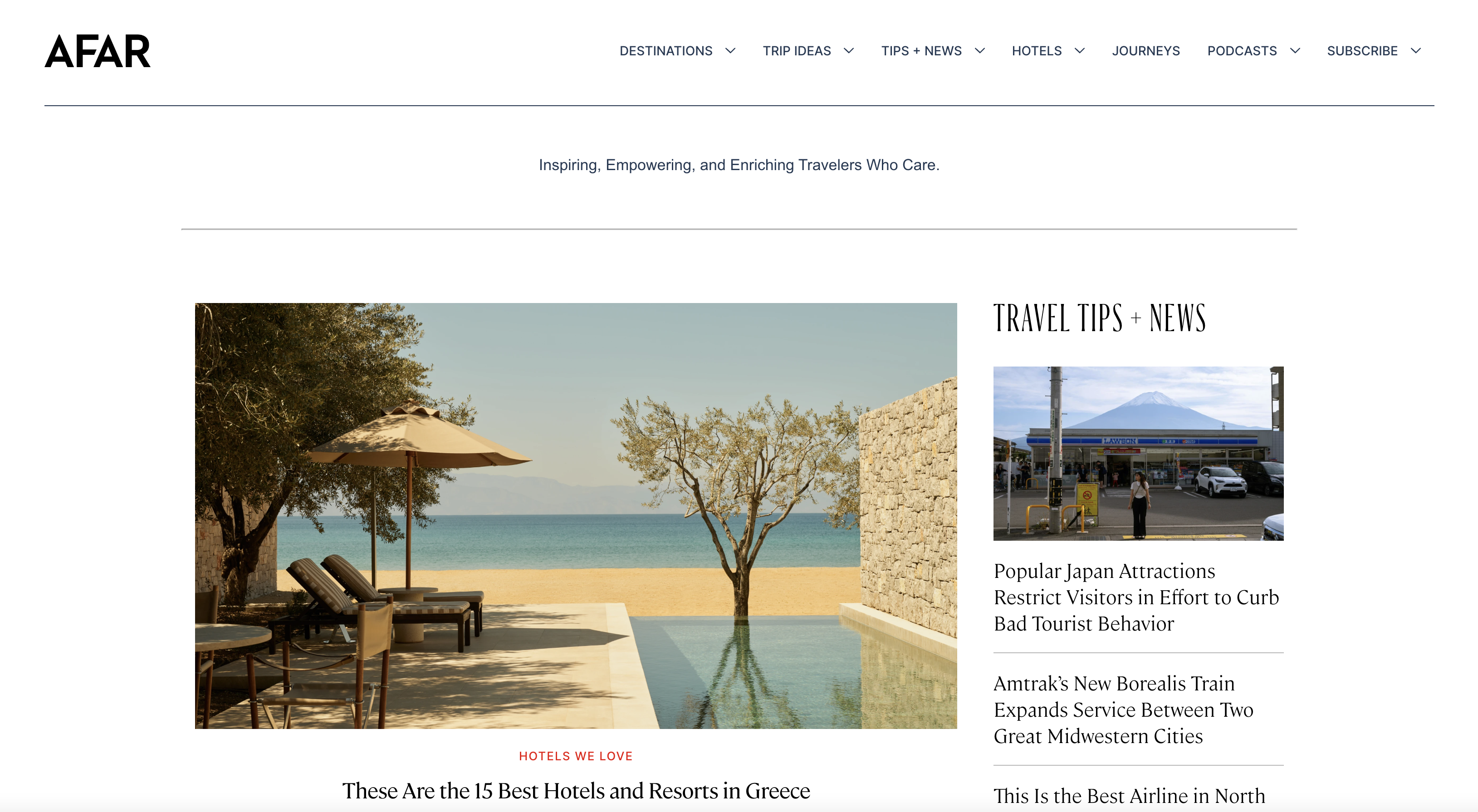
Now have a look at the top 10 pages ranked by organic visibility for these sites in August ’22:
Thrillist (Aug ’22):
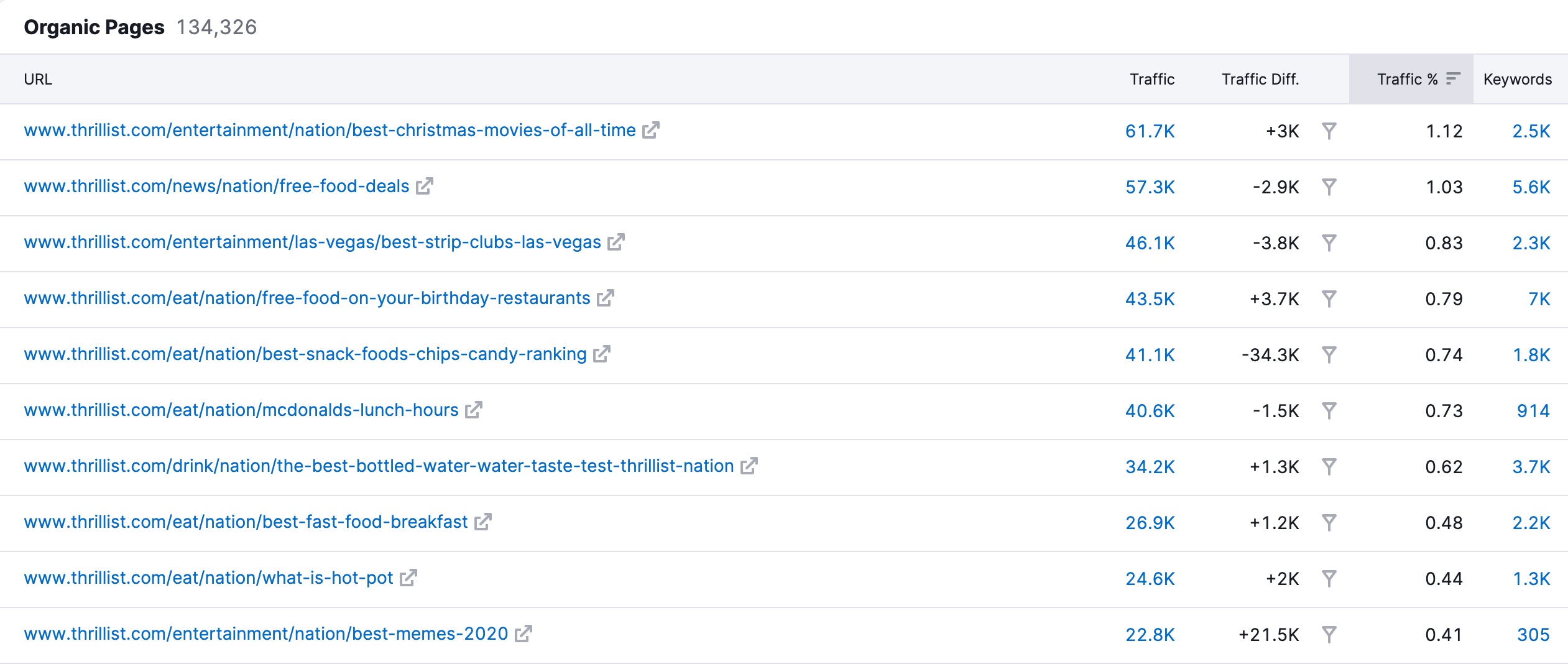
Afar (Aug ’22):
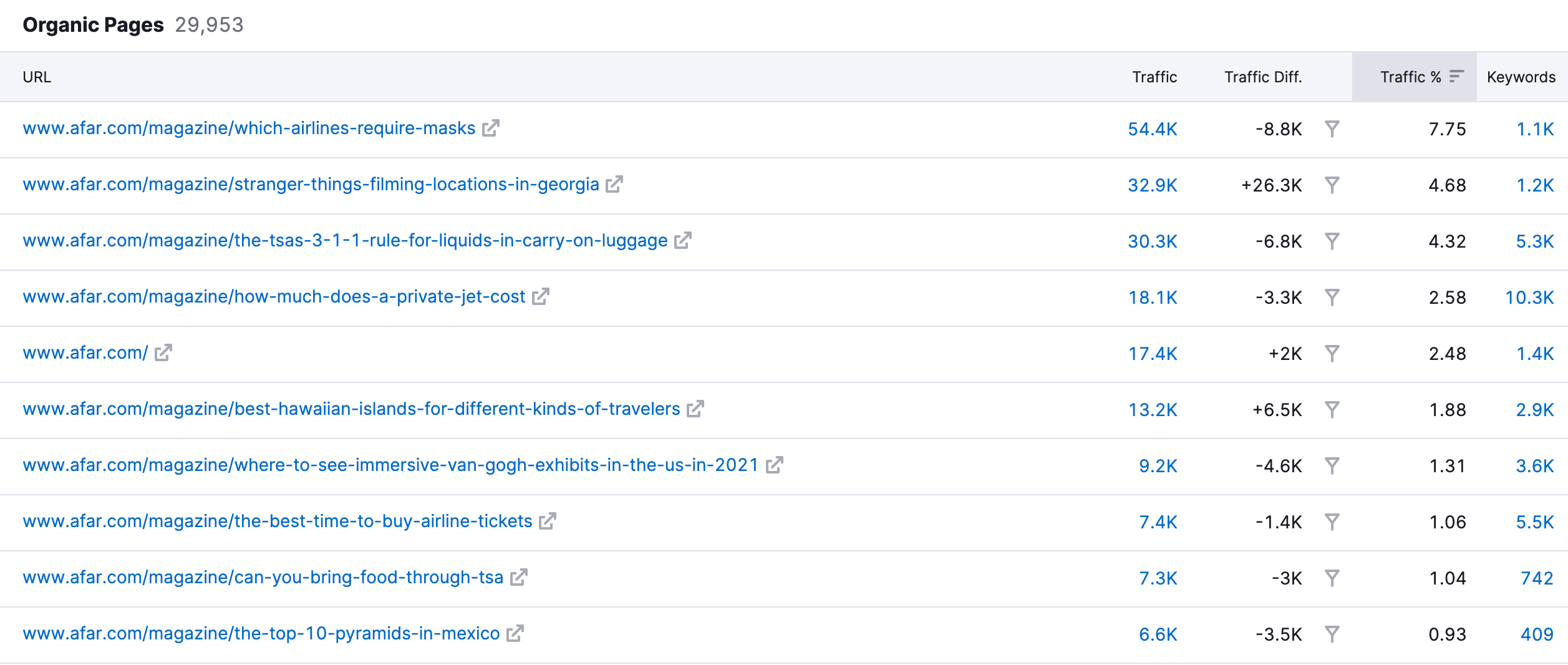
And the same in May ’24:
Thrillist (May ’24)
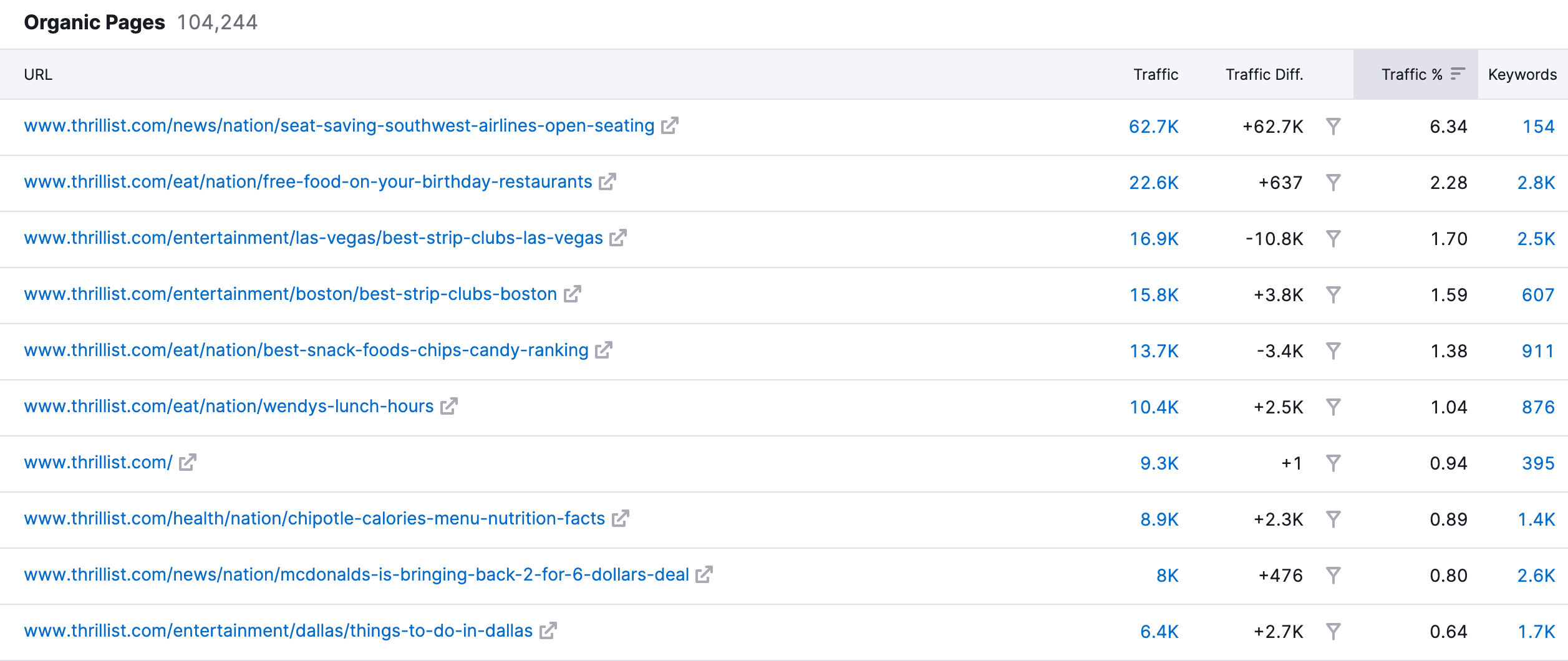
Afar (May ’24):
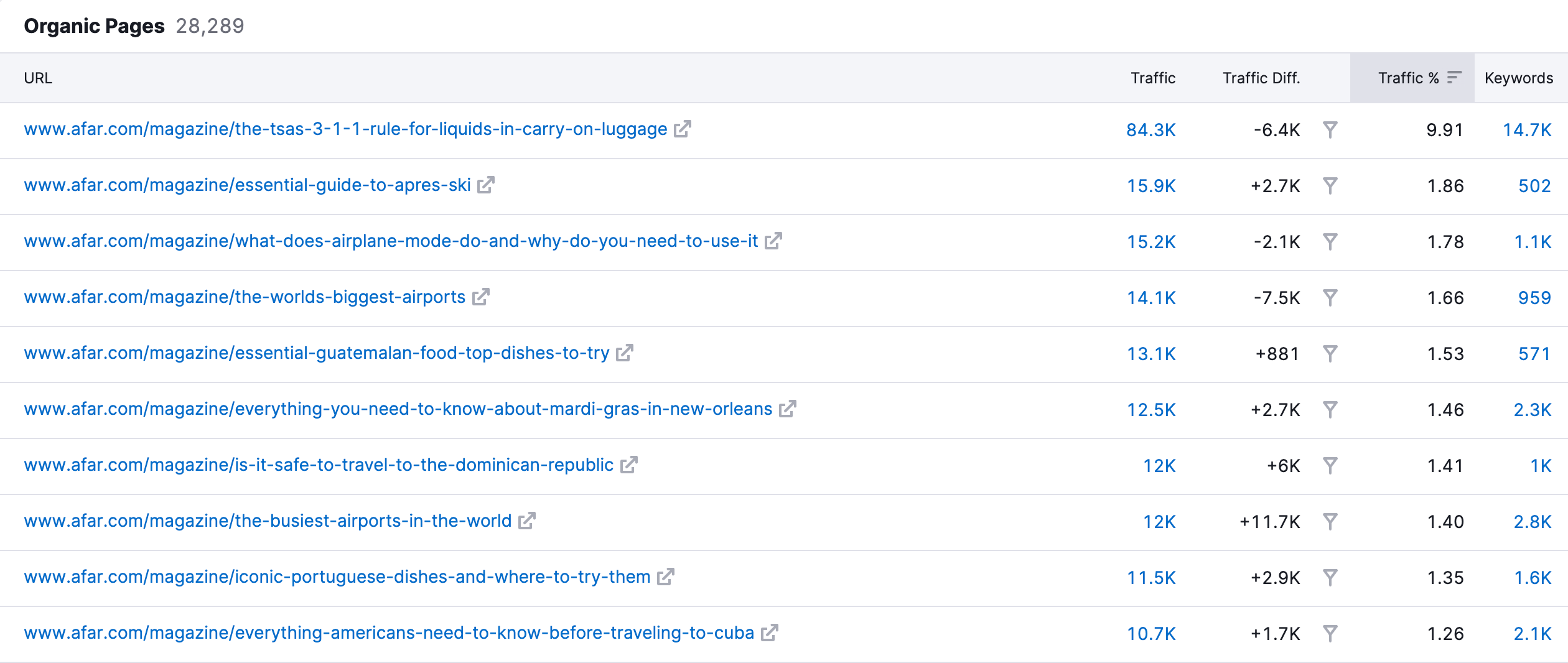
Notice anything?
Take a look at Thrillist’s homepage again, specifically the nav menus:
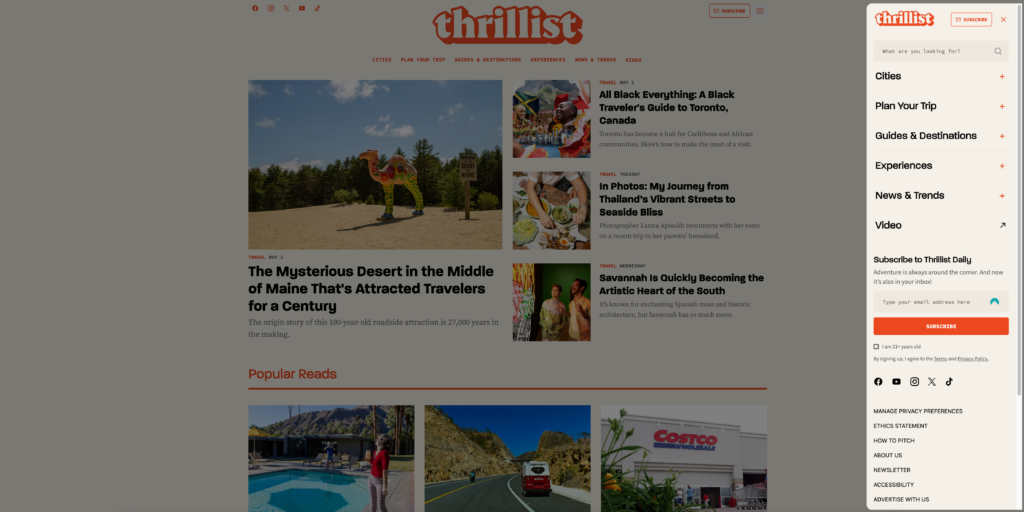
What stands out?
Travel? Experiences? Destinations?
Let’s look at the site’s About Us page:

No real questions about the site’s areas of authority. There’s a clear crossover between travel and things like art, history and nightlife; especially from a point of view of informing and inspiring travel plans.
So then, why the hell was Thrillist’s top page in August ’22 a roundup of the best Christmas movies? And what does a guide to the best memes have to do with travel?
Hmmm…
And even when we look beyond these, some of these topics are a bit questionable.
McDonald’s lunch hours?
I want to see my local restaurants’s Google Business Profile listing with times, or the McDonald’s site. Not an article from Thrillist.
I get the link between food and travel. But McDonald’s? That’s really pushing the boundaries of travel.
The best bottled water?
This really feels like “content created because it can rank and drive traffic” rather than content that you’d create for your audience if Google weren’t sending traffic.
This was a section on the site’s homepage in December 2021 (the closest result on Archive.org):
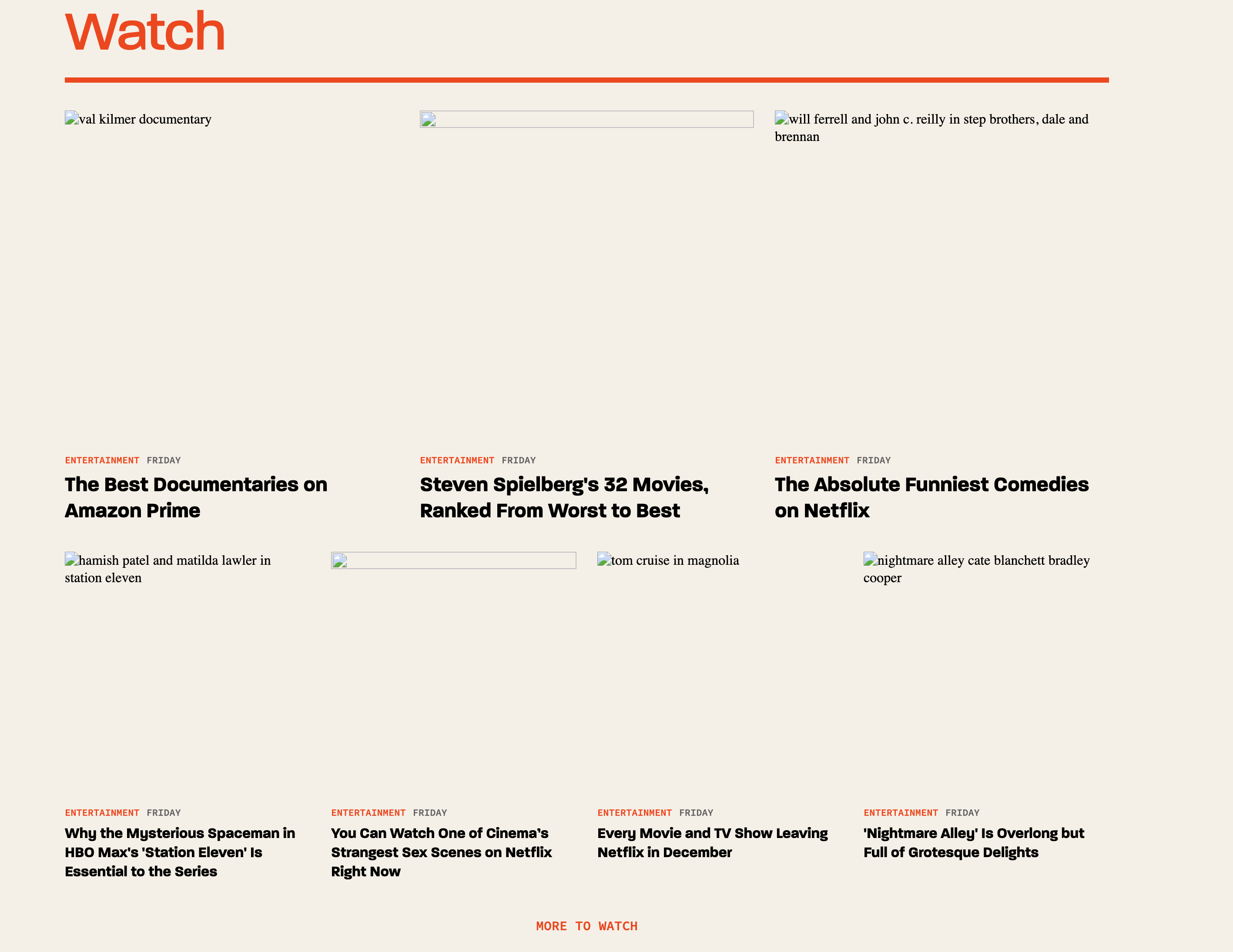
Albeit at the bottom of the homepage, there was a ‘watch’ section which was all movie-related content.
My theory that’s starting to build is that many sites that were ‘pushing the boundaries of relevancy’ have seen hits in the HCU. No, it doesn’t explain every site that saw drops. Far from it.
Here’s Travel Lemming’s top pages in August ’22:
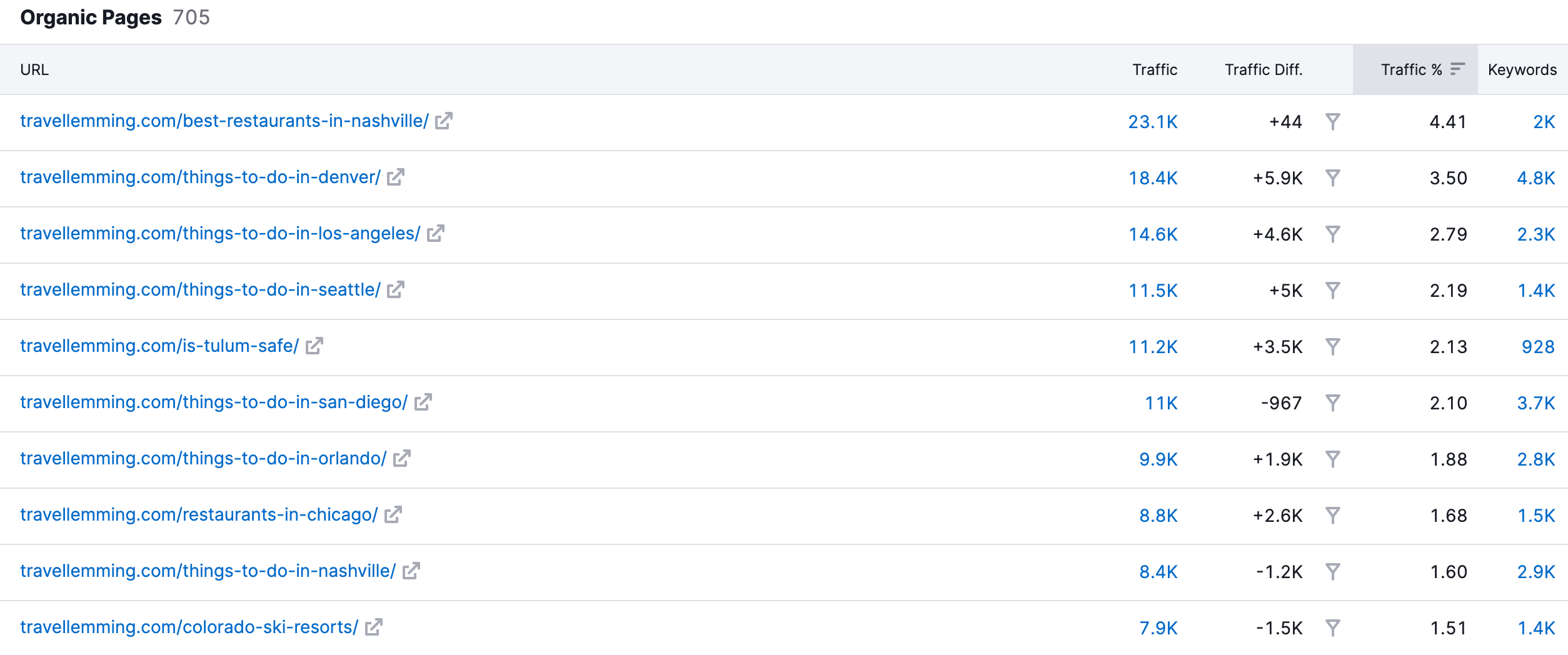
But then we do see a footprint of ‘search keywords’ here. Lots of pages with the same ‘keyword’ type.
And the same here (Touropia.com):
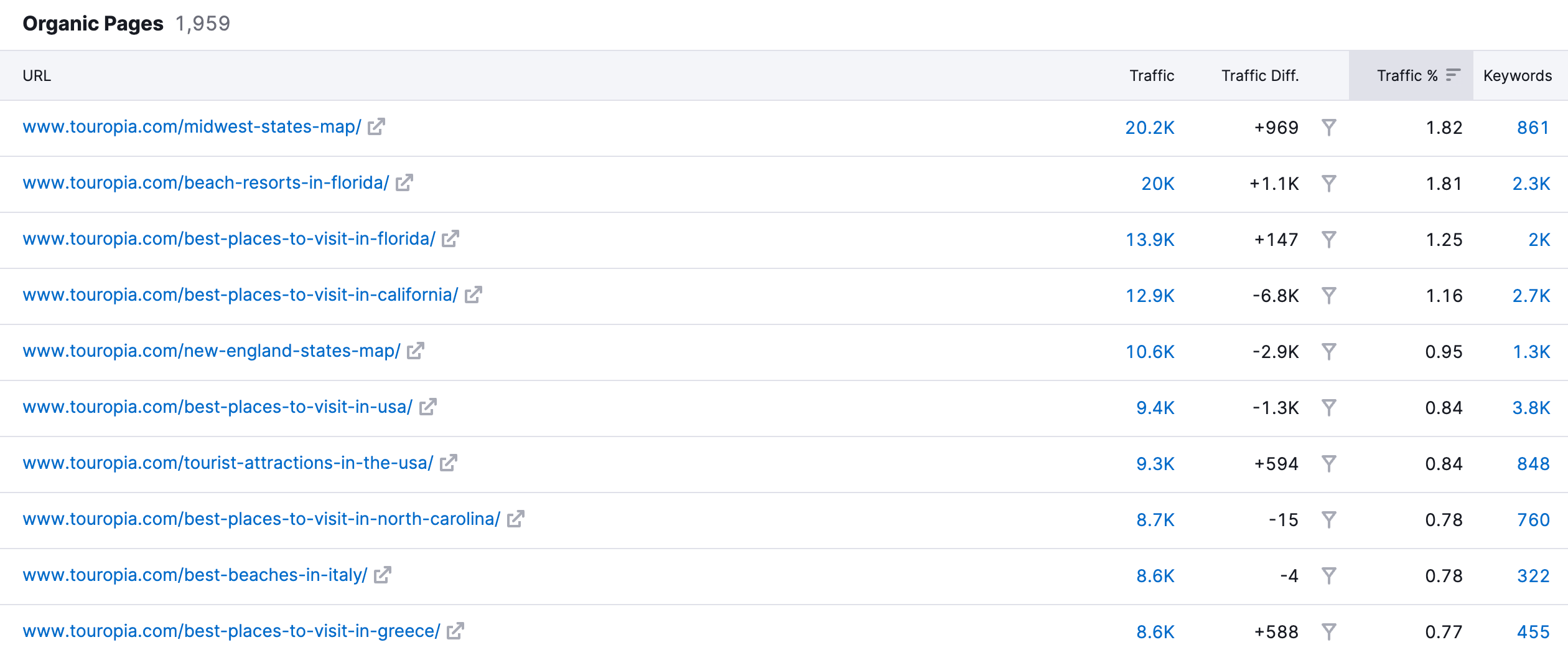
And here (Hand Luggage Only):
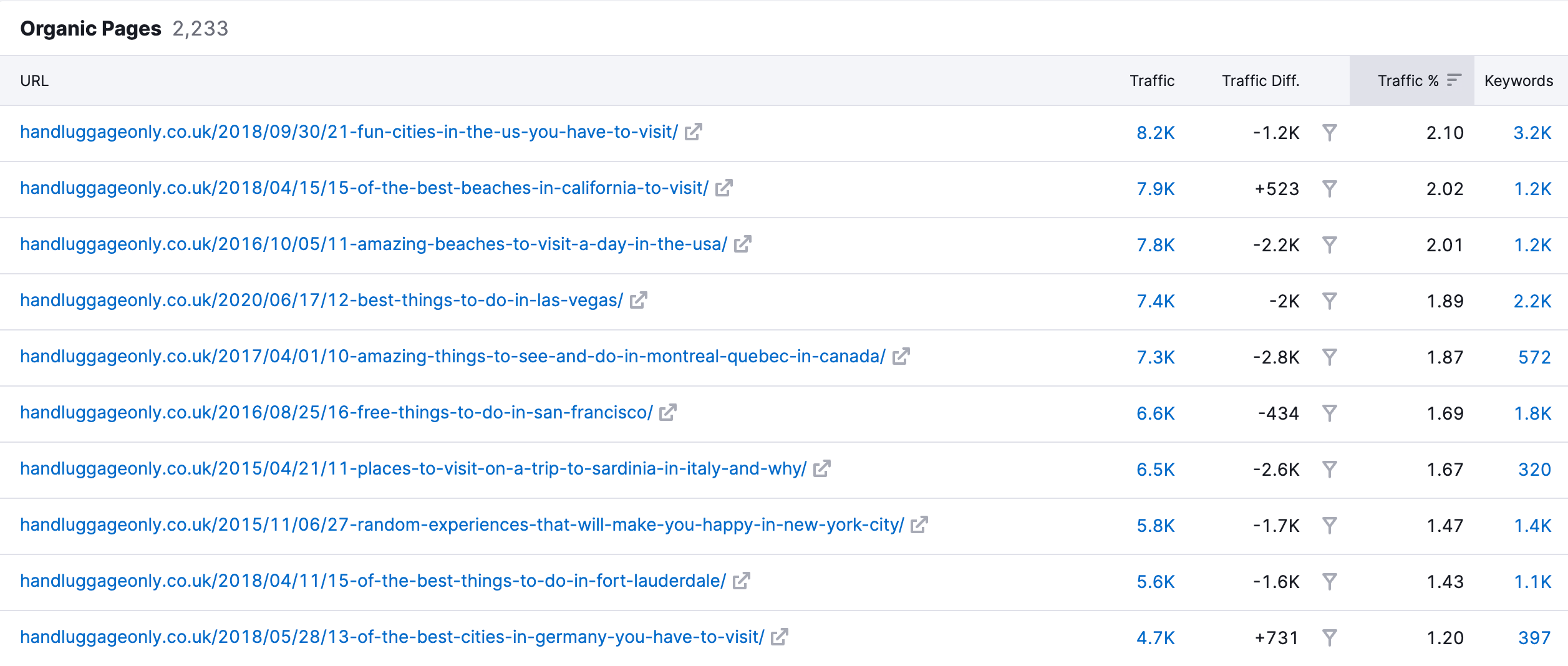
These all lost traffic in the HCU.
So what about another site that gained traffic?
Here are Travel and Leisure’s top 10 organic pages in August ’22:
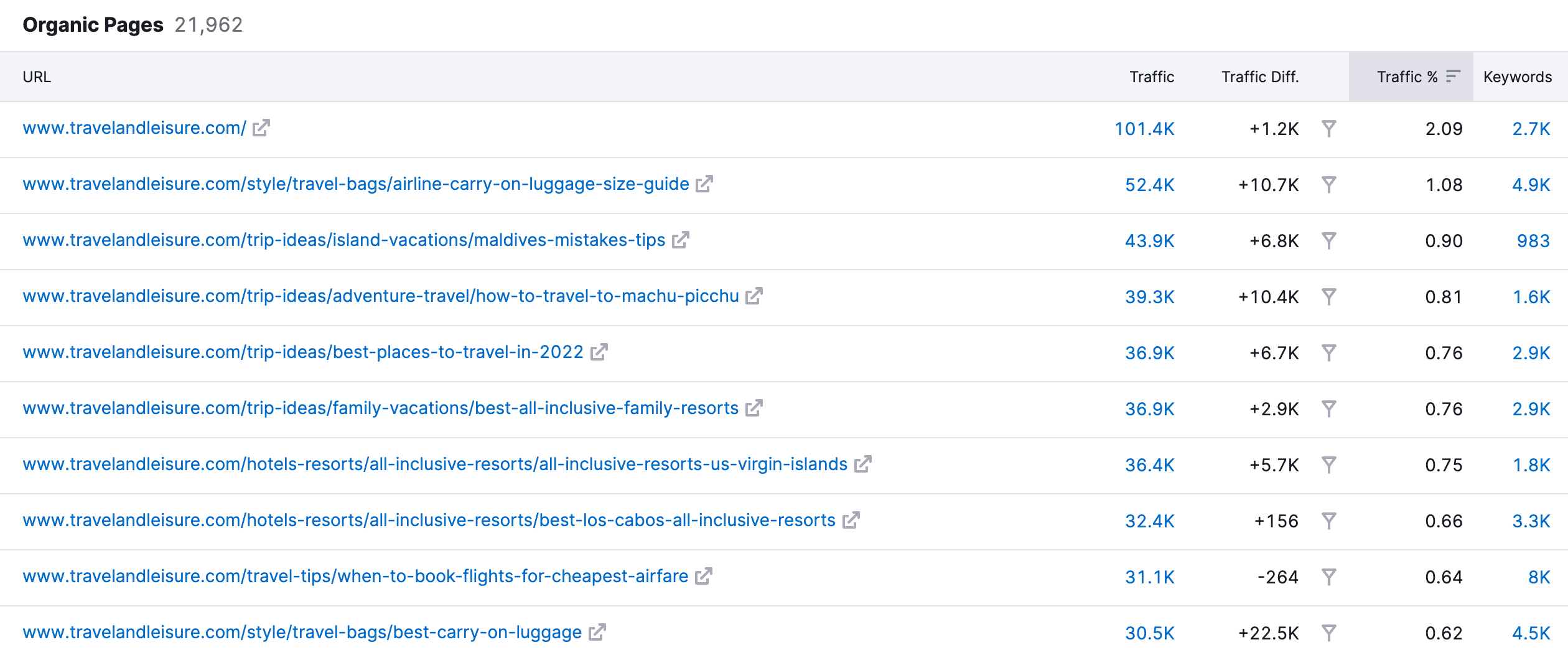
And the same for WDW Magic:
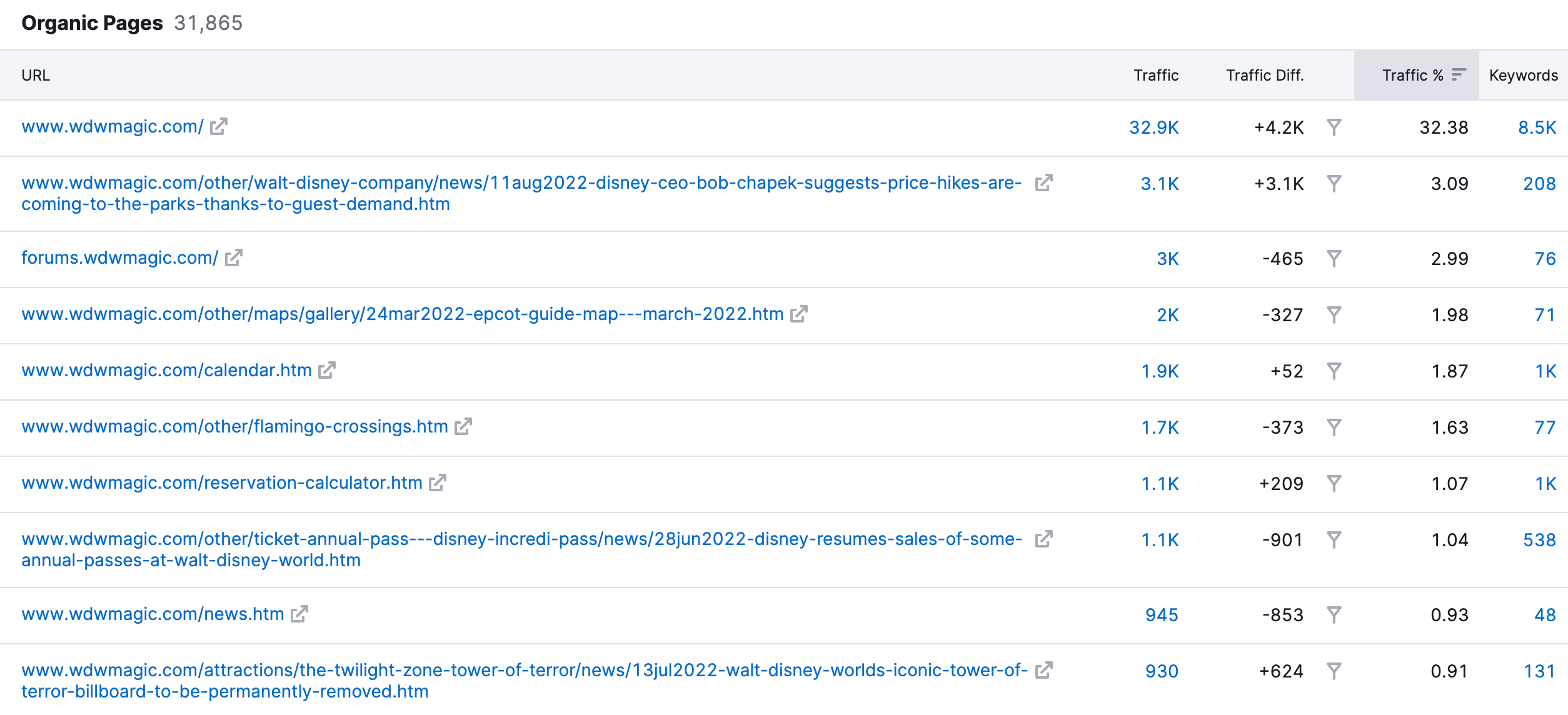
And Touring Plans:
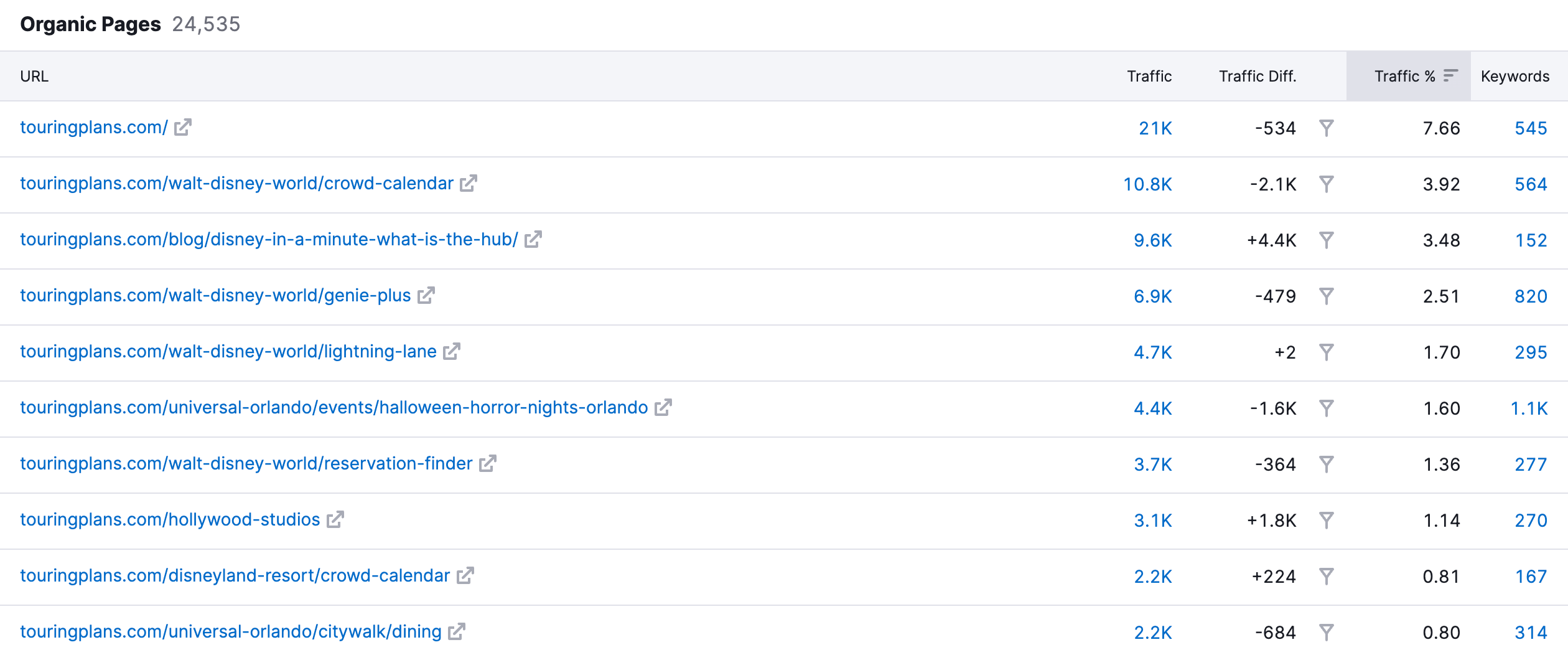
Whilst I don’t for a minute think it’s the only factor at play with the HCU, there’s definitely some connection here. The sites that lost traffic all have some level of ‘keyword’ targeted content. The ones that gained, this is far less obvious.
Nor, of course, do I believe this is fair.
A site can have content that’s optimised for discovery on Google and still be helpful. Of course it can. But I’m looking for trends and things that stand out as the reasons why some sites got hit, and others didn’t.
The impact of the HCU on travel publishers’ keyword visibility
Traffic is the big one, I get it. It’s indirectly what pays the bills for these sites.
But it’s not the full picture, and that means we also need to look at how these sites’ keyword visibility changed over the update periods.
Between August ’22 and May ’24, 512 of the 671 travel publishers studied (76%) saw the number of keywords that the site is visible for decline. The average change in ranking keywords seen was -37%.
However, this is where averages don’t show the full picture.
Of the 671 publishers, 266 lost more than half their total keyword visibility. And remember, these are all keywords ranking in the top 100 results. It doesn’t mean they’re all driving traffic.
40% of the sites studied are no longer ranking at all for over half of the keywords they ranked for in August ’22. That’s a big change, in my opinion.
Where the biggest insights come from, though, is looking at the impact of the HCU on top 3 rankings, the keywords that were previously driving traffic to the sites.
The impact of the HCU on travel publishers’ top 3 rankings
When we look at the impact of the HCU on the top 3 rankings previously held by travel publishers, we really start to see the full extent of this update.
Of the 671 publishers analysed, 571 of these lost top 3 rankings. That’s a staggering 85%.
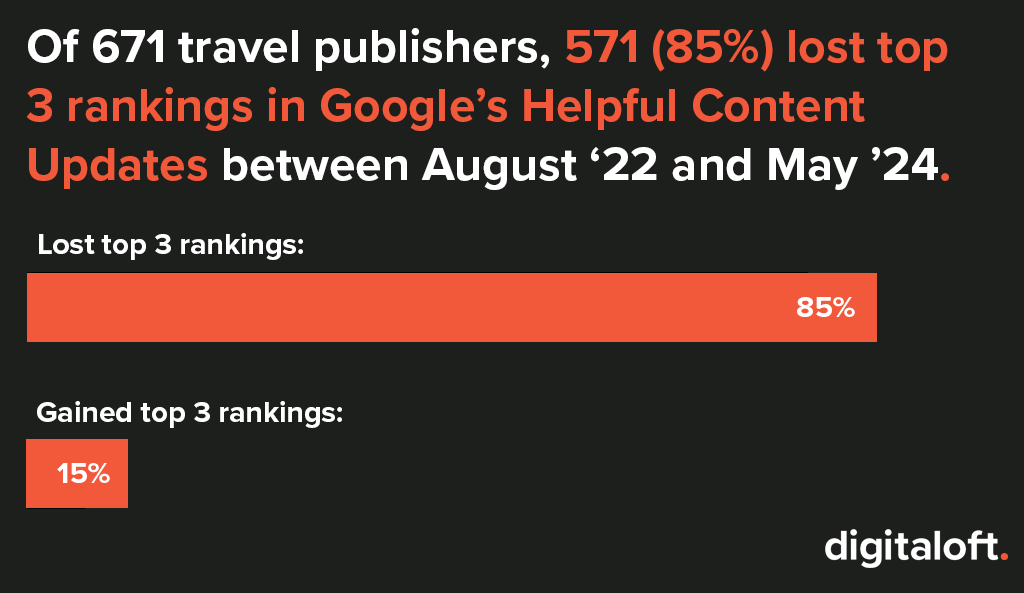
This is where, in my opinion, the HCU has hit the hardest. Preventing the affected sites from ranking in traffic-driving positions.
But as we keep digging, there are even more surprises.
Of these sites that saw the number of top 3 rankings they previously held decline, 78 of them (14%) lost all of these. The number of keywords they now rank in top 3 positions for is zero.
Add to this the 175 sites (31%) that lost more than 90% of their top 3 rankings and it doesn’t take long to see what this update did to so many sites.
38% of all of the sites we studied saw the number of top 3 rankings held reduce by more than 90%. I’ve not seen these sort of drops since Penguin back in 2012. And many of us remember the impact that had, and the fallout from it.
The last few HCU’s have felt so much like Penguin in many ways, to me. Not necessarily in terms of what is being targeted, or even how. Google has evolved so much since 2012. But in terms of the industry’s response and the extreme impact seen by, let’s face it, many businesses who simply didn’t expect it to happen.
On the flip side, of these 671 sites, only 22 (3%) saw growth in top 3 rankings of more than 100%. And when we’re talking about rankings, larger growth numbers are far more common. Especially given the snowfall effect that’s often seen in SEO.
In fact, only 68 (10%) sites saw a growth in top 3 rankings of more than 20%.
What does this tell us?
That it’s pretty damn obvious that it wasn’t other travel publishers who took the rankings of those that lost ground. And whilst we’re all aware of Reddit’s surge by now, what I’ve not seen talked about anywhere near as much is that an awful lot of offline businesses (if I can call them that; businesses that could exist without Google) have seen good wins in these updates, taking the rankings previously held by publishers.
How travel publishers are feeling following the HCU
So many travel publishers that experienced traffic losses in HCU didn’t deserve it.
Yes, there are plenty of examples of sites we can pull out that probably did deserve it. For each of these, there are probably two or three who didn’t.
I recently had the pleasure of a brief chat with Nate Hake, founder of Travel Lemming. Sadly, this site made its way onto the list of sites that lost significant amounts of traffic in the HCU, despite being what I’d confidently say is an example of one of the sites that absolutely did not deserve to be negatively impacted.
In fact, I’d say they’re the perfect example of a site that should probably have gained traffic from these updates, at least when we take Google’s word that their goal was to surface human-first, helpful content.
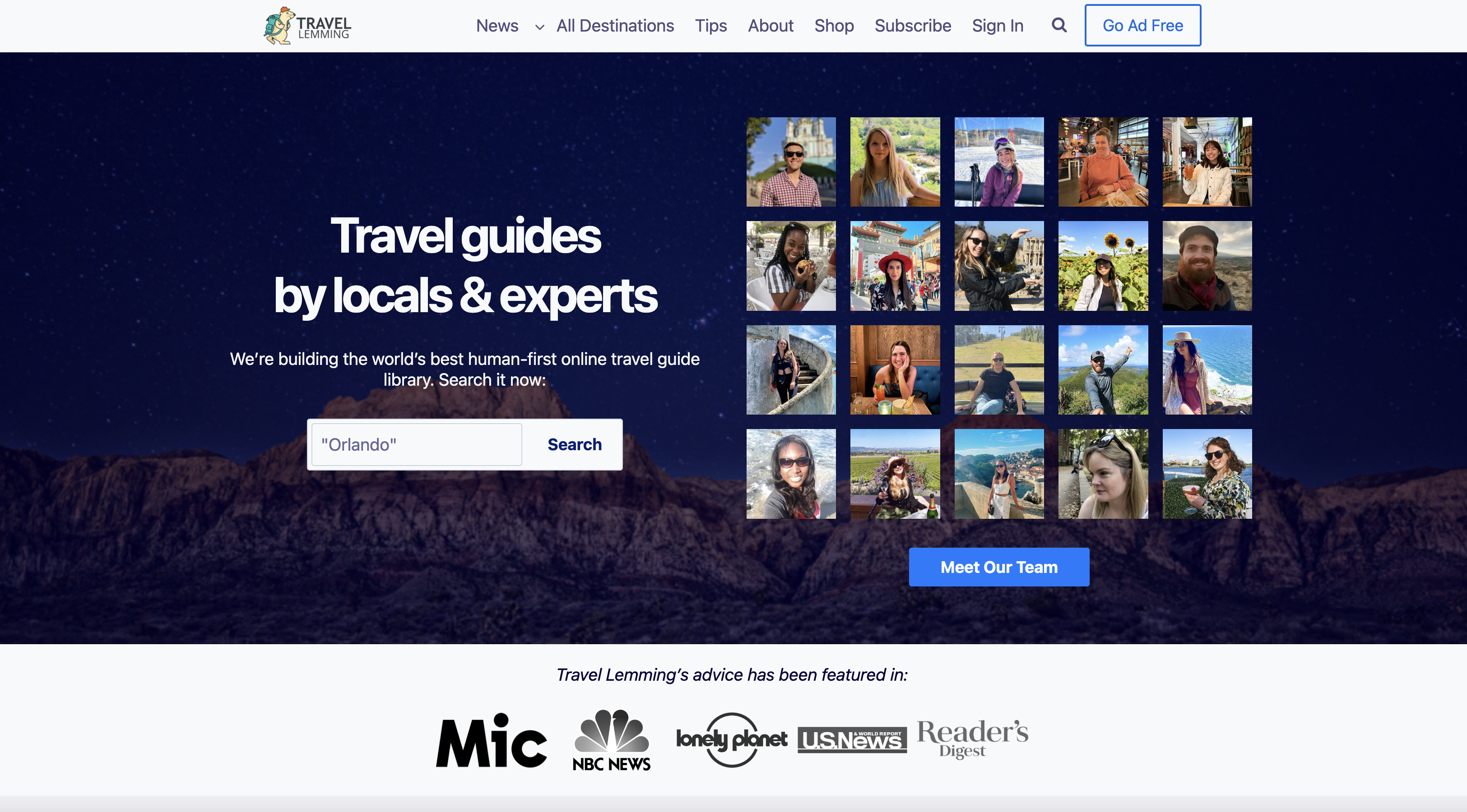
“Travel guides by locals & experts…”
I mean, how much more ‘by humans’ can you get?!
One of the biggest gripes people have had over the last few years with travel publishers (blogs, particularly) is a lack of experience. If someone’s sharing tips or recommendations, you’d expect them to have actually done these things, stayed in these places or eaten in the restaurants. How can you make recommendations if not?
So a travel publisher whose content is produced by locals? Perfect! Surely this is exactly what searchers want to see?
At least, you’d think so, wouldn’t you?
I asked Nate about Travel Lemming’s approach to content creation, ensuring it aligns with E-E-A-T and the things the helpful system is meant to love, as well as his thoughts on what’s been happening in these updates.
Here’s what he had to say:
We hire locals who can write from first hand experience. We put a lot of work into our guides. We update them regularly, and take a lot of original photos. We don’t accept sponsored hotel stays, and we don’t go on sponsored trips. We give expense budgets to our creators to visit attractions and restaurants. When we test products, we buy them with our own money. We run community meet up groups in several of our cities. It all gets expensive. All in all, last year we invested mid-6 figures into our content.
Nate Hake, Founder of Travel Lemming
I’m definitely not saying we’re perfect, but I’m saying we do aspire to help people. And when we collect reader feedback, it’s generally glowingly positive.
We also always seek to improve. Our user metrics are up 40% since September. But, despite all that effort, we just got smacked further in March.
Again, I don’t think we are perfect. But I do think we are considerably more perfect and authentic than the answers given by Google’s AI travel tools. Even in their demo announcing their AI travel plans, SGE recommend a ridiculous Philadelphia itinerary where the entire morning was spent staring at the Liberty Bell.
Let’s call it what it is: slash-and-burn training. Google is burning down the travel SERPs to make way for its new AI travel tools. The global tourism industry is worth $2 trillion, and Google wants a slice of the pie.
Looking at the Travel Lemming site, I’m a big fan of their content. In fact, as a content consumer rather than an SEO, I genuinely find it helpful, engaging and user-friendly.
Take a look at their ‘Los Angeles’ page, for example:

And then if we start to look through their guides, they’re full of awesome little snippets like this:
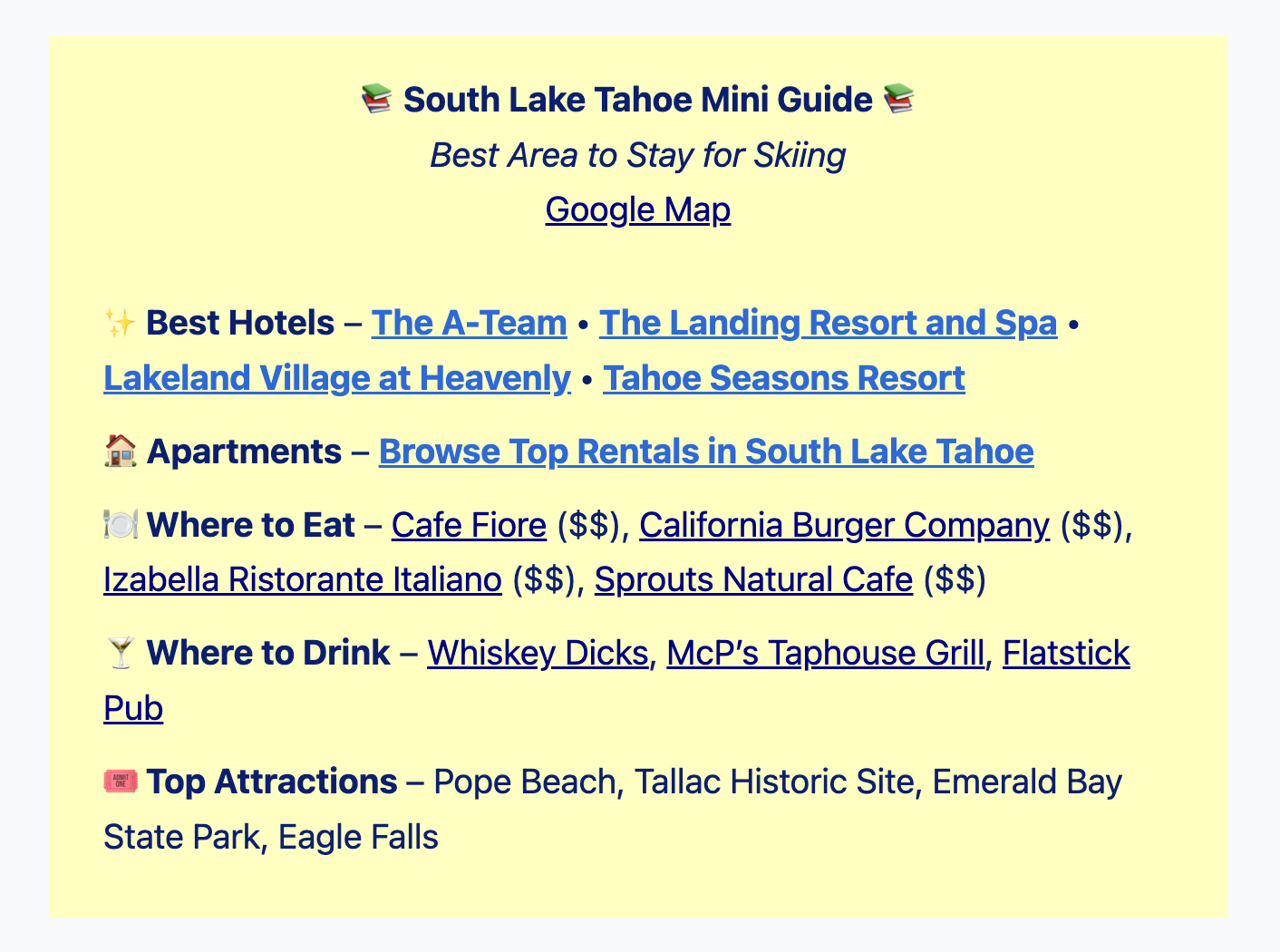
As part of a guide on ‘Where to Stay in Lake Tahoe,’ things like this are welcomed as a user. It should never all be about long-form editorial; rather, helpful content should mean being about content that helps someone to find the answers they’re looking for.
And blocks like this as part of a longer guide are really helpful, at least to me.
There’s been lots of suggestions about what the HCU targets that one factor is whether or not content actually answers the query, and whether there’s too much ‘filler’ content.
In fact, as I was about to publish this post, I saw this on X:
And in principle, I do agree that ‘filler’ content that has large parts included just to hit a word count, or content where the query isn’t really answered, should take a hit. At least if there’s better content that exists.
But I wouldn’t say that’s the case with Travel Lemming.
Looking at the site’s guide to hikes near Los Angeles:
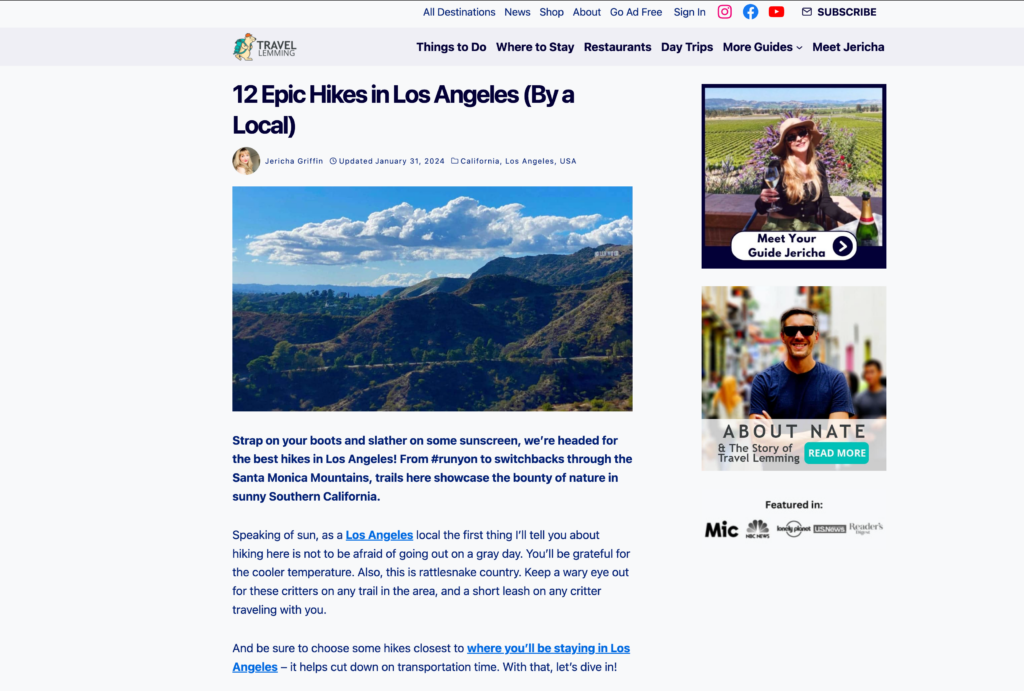
I wouldn’t say there’s any filler content, here.
Not when you look at what’s included for each recommended hike:
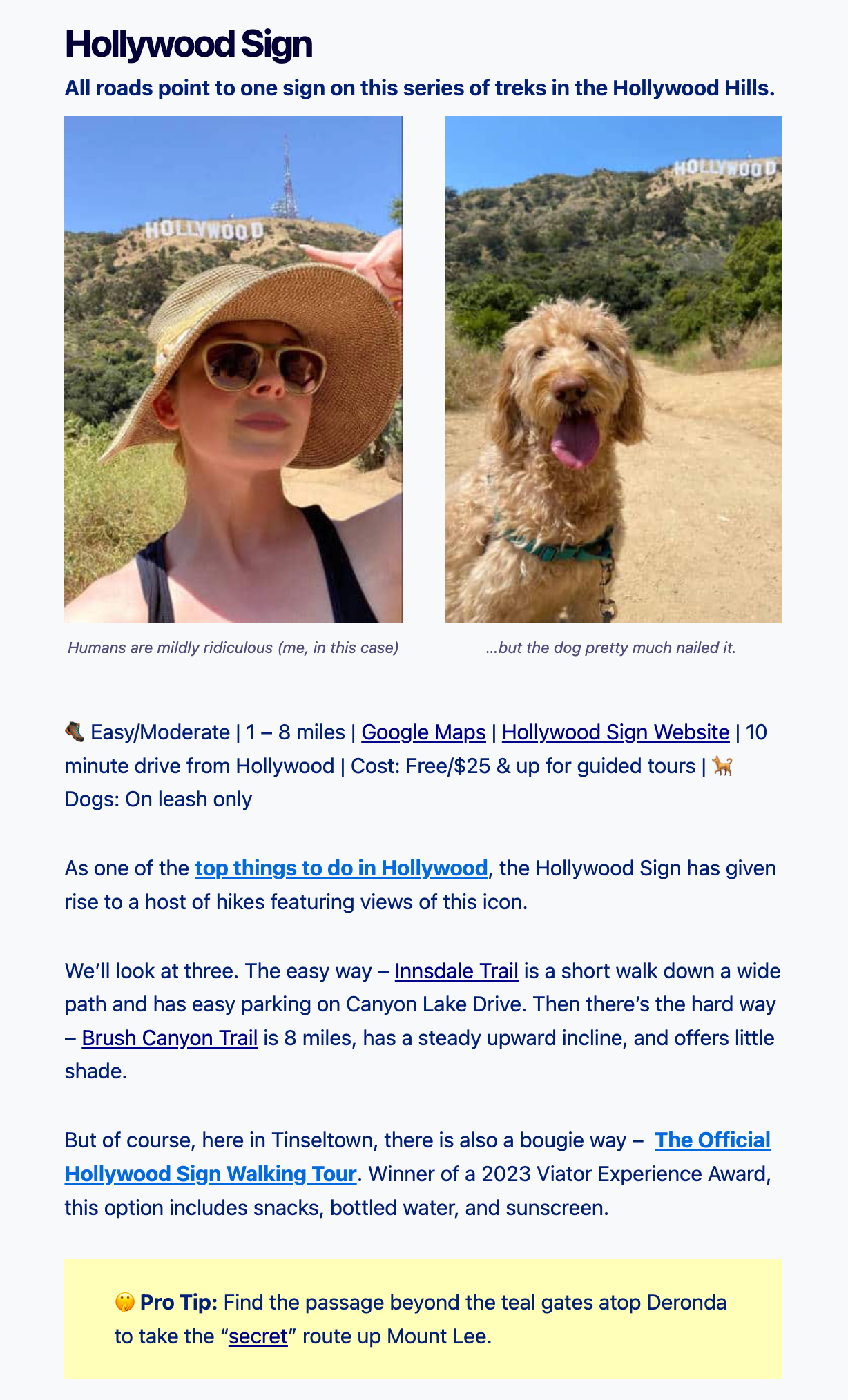
If I’m a tourist visiting LA and want to go on a hike, I don’t feel there’s much missing here. Or anything I wouldn’t want to be shown.
This site is an example of one that shouldn’t have been hit by the HCU, in my opinion. And upon hearing Nate’s insights on the lengths they’ve gone to in order to create human-first content, it just confirms my thoughts even more so.
Isn’t this what content creation should be about?
Going above and beyond to create something helpful, rather than just leveraging ‘brand’ authority to rank? But then, let’s not forget lots of travel publishing ‘brands’ saw a hit too. The plot thickens…
How the travel SERPs have changed since the HCU
While analysing the impact on traffic, keyword visibility and top 3 rankings tell us a significant part of the HCU story; it doesn’t show us what has replaced these travel publishers on the SERPs.
And to start to understand what this looks like, we can start by comparing the SERPs from before and after the HCU across a sample of queries that some of the sites with the most significant losses previously ranked for.
Of the 671 travel publishers included, the one that lost the highest amount of traffic was Planetware, losing a staggering 3.6 million organic sessions per month.
Let’s look at how the SERPs have shifted for five of the highest traffic-driving queries the site held back in August 2022, just before the first HCU landed.
| Keyword | Monthly Search Volume | Rank (Aug ’22) |
|---|---|---|
| All Inclusive Resorts Florida | 33,100 | 1 |
| Colorado Ski Resorts | 22,100 | 1 |
| St Lucia Resorts | 18,100 | 1 |
| Key West Beaches | 18,100 | 1 |
| Springs in Florida | 14,800 | 1 |
Let’s look at how the SERPs have shifted between August ’22 and May ’23 for these terms that Planetware previously ranked position 1 for…
All Inclusive Resorts Florida
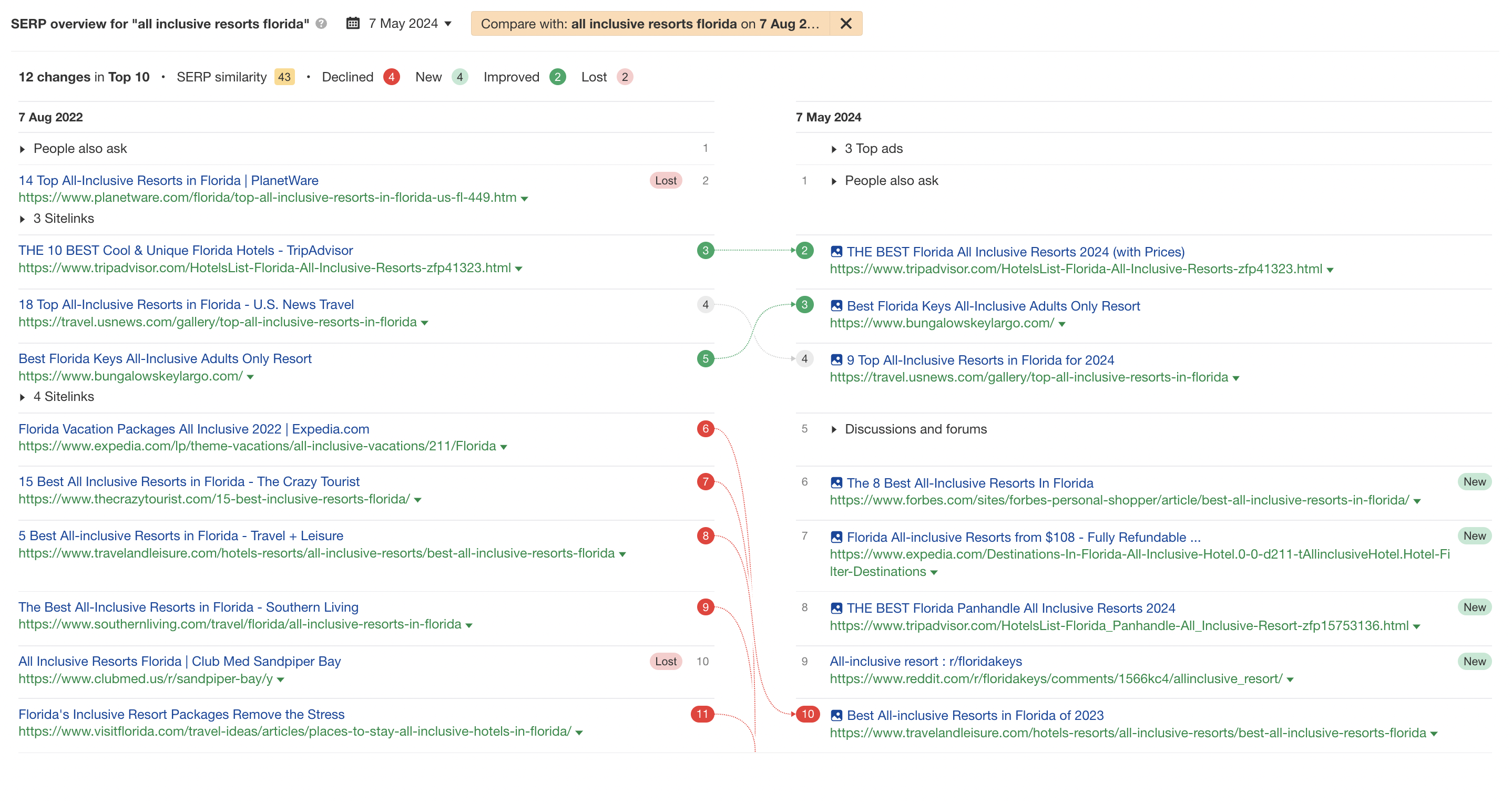
Colorado Ski Resorts
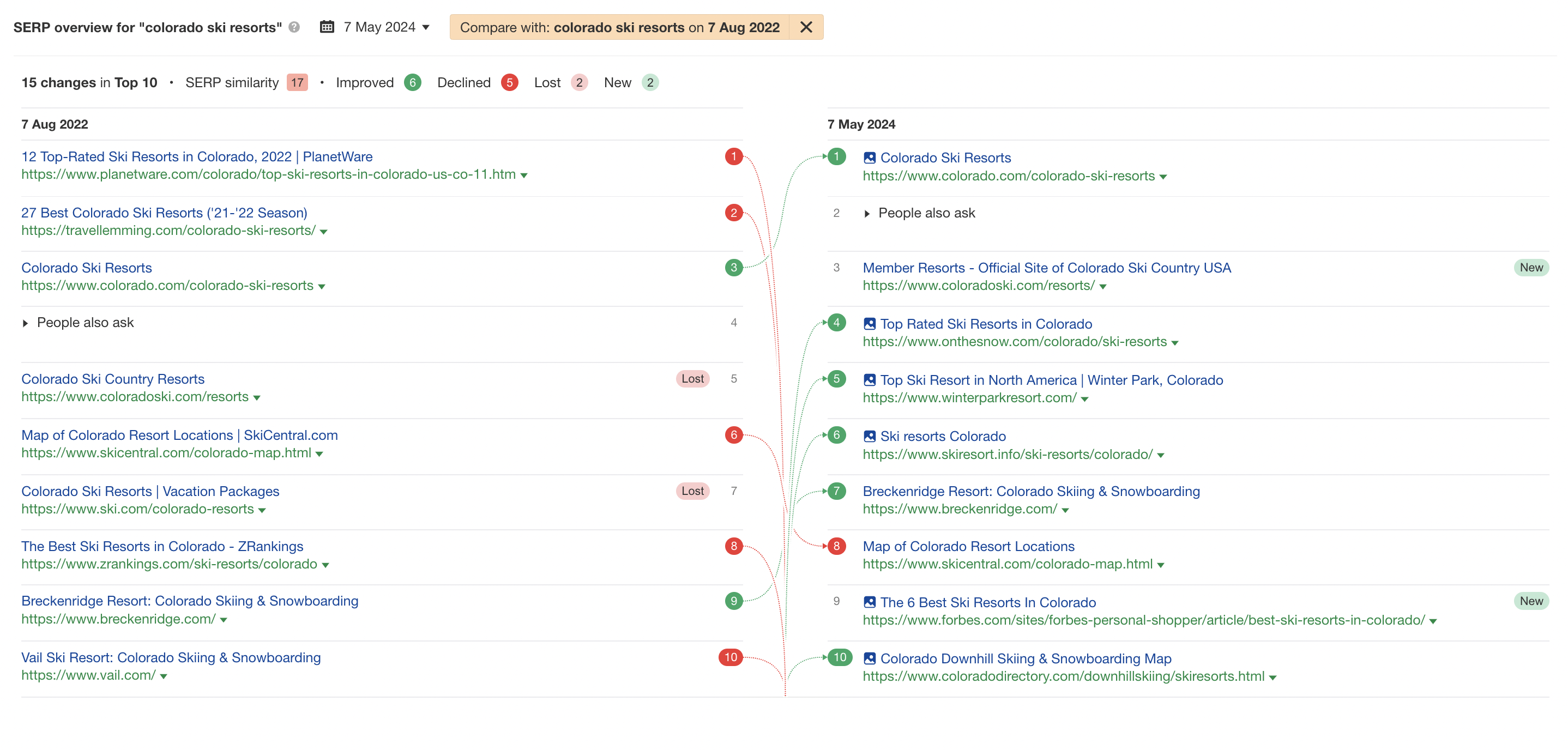
St Lucia Resorts
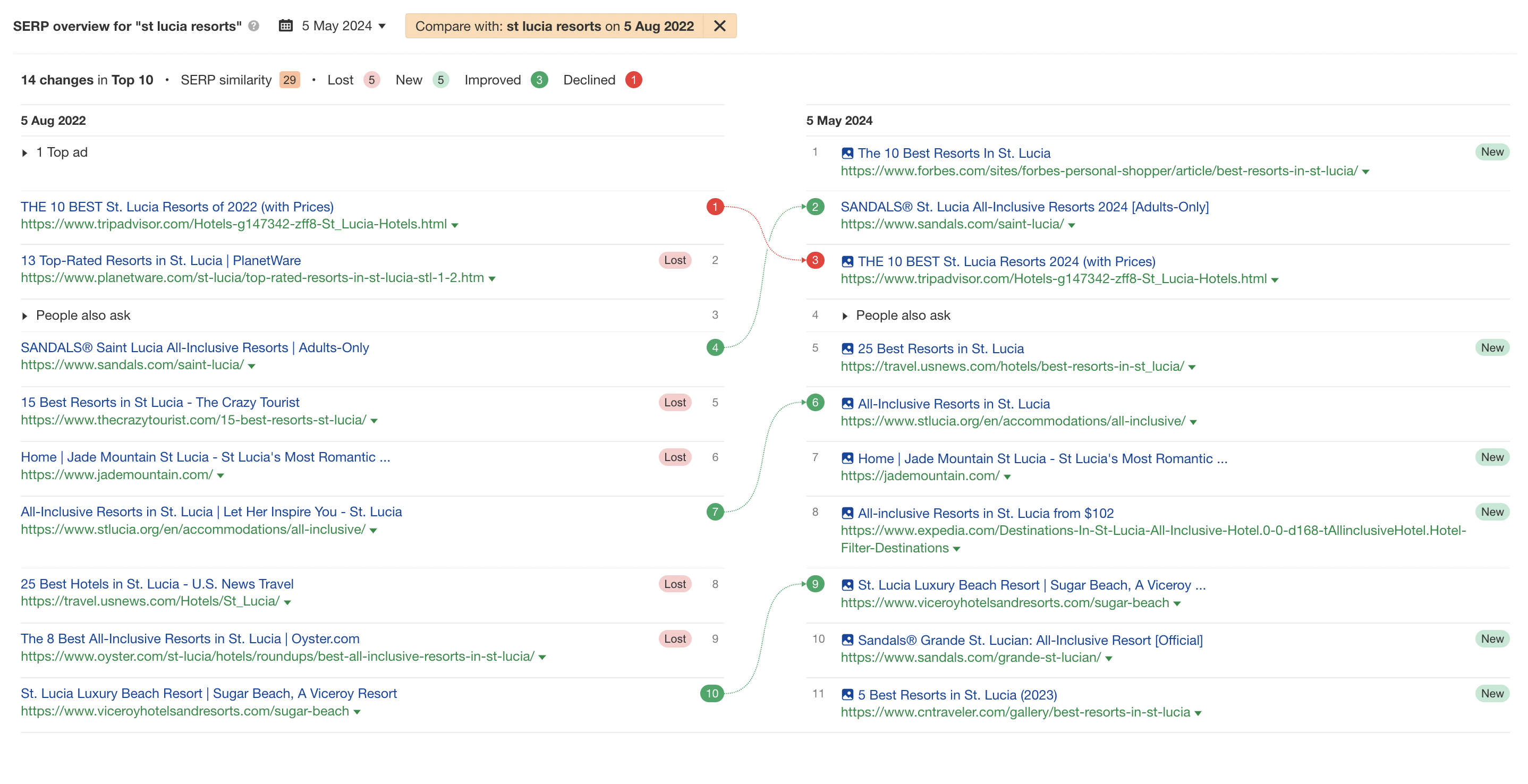
Key West Beaches
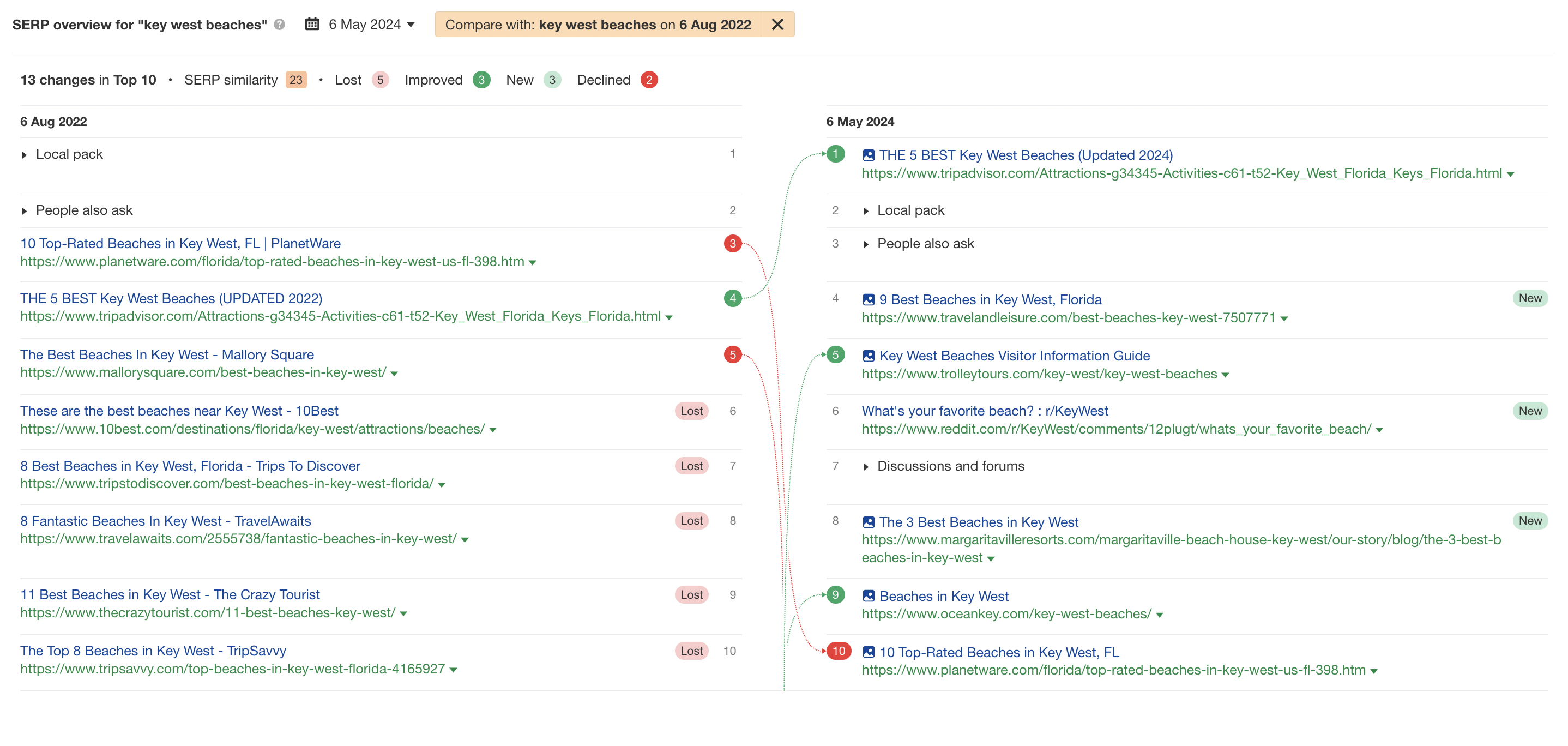
Springs in Florida
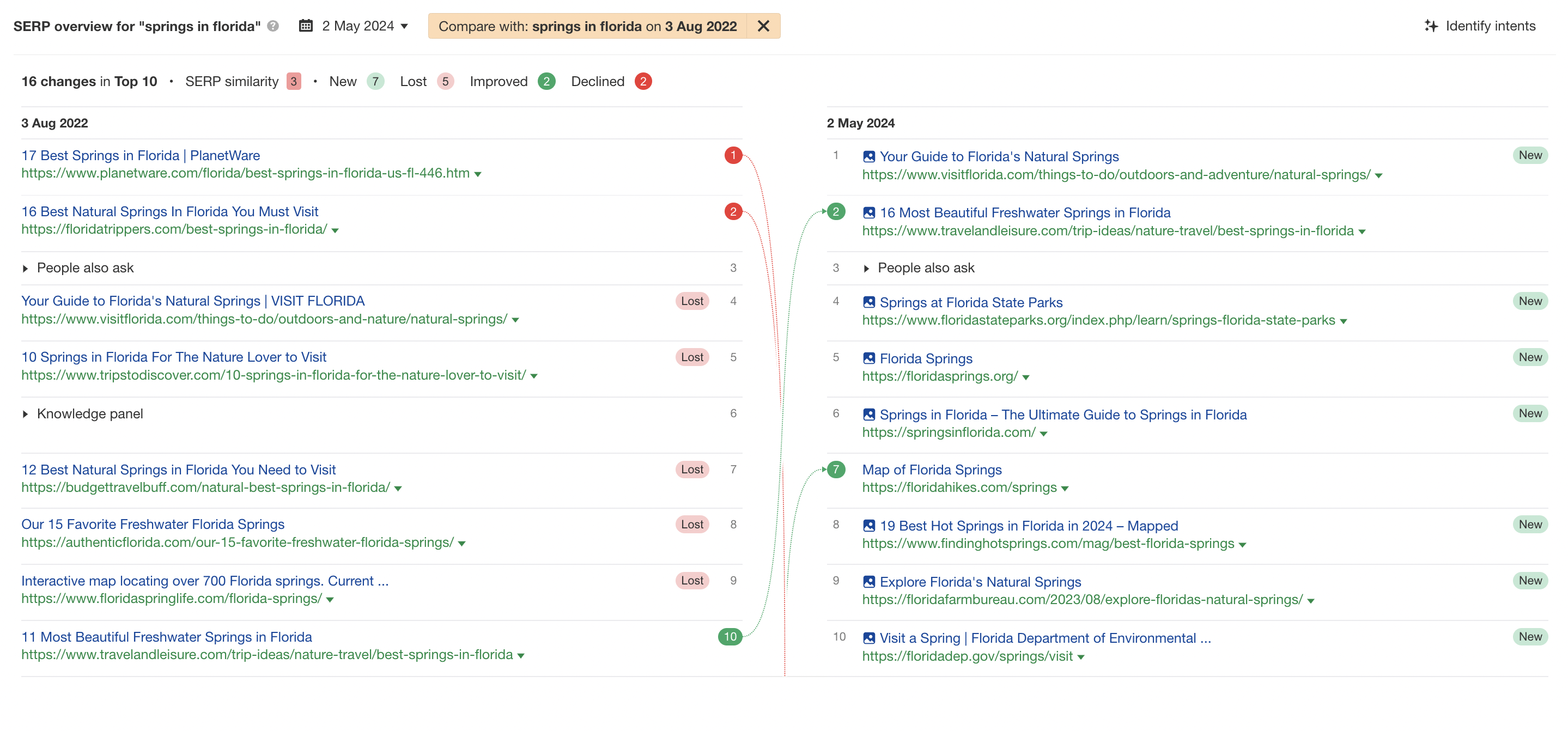
Whilst we do see some of the rankings remaining, at least within the top 10, there’s no denying that there’s been a significant shift in the results shown for these queries.
Possibly the biggest observation is that it’s not just Planetware that dropped off the front page of the SERPs for these type of queries. Other similar results saw the same trend.
‘Publisher’ results have, at least to a certain extent dropped off in favour of the likes of TripAdvisor, Resorts themselves and, to a much lesser extent than you’d be led to believe, Reddit.
Could this be SERP diversification? Where Google is showing a wider range of result types? Perhaps, but I’m not convinced. There are enough ‘informational’ results ranking for these queries that suggest that the HCU isn’t just about content helpfulness.
Take, for example, the SERPs for “Springs in Florida.”
Pretty much the whole of the top 10 results have shifted, which is rare to see.
Look at it from a user perspective, and it’s easy to infer that someone searching ‘Springs in Florida’ is looking for information on which springs there are, which are recommended and where they are.
And I totally get ‘Visit Florida’ taking that top spot for this term. It makes sense and likely deserves to rank at the very top as the State’s tourism board.
But what, if anything, makes Travel and Leisure’s guide so much better than Planetware’s?
Here are my thoughts, having looked at a number of factors:
| Planetware | Travel & Leisure | |
|---|---|---|
| Ads | Sidebar ads, (a lot of) in-content ads | Leaderboard ads, sidebar ads & universal player (video) ads |
| Author | Shandley McMurray, a Canadian travel writer who is currently based in Connecticut. | Skye Sherman, a freelance travel writer based in West Palm Beach, Florida. |
| Last updated | August 4th, 2022 | June 20th, 2023 |
| Word count | ~3,500 words | ~2,000 words |
| Images | Stock images, unable to locate source. Identified via reverse image search. | Stock images, credited to Getty Images |
| Number of springs included | 18 | 16 |
| Notes on the content’s helpfulness | The address is given for every one of the springs, something that’s really useful for anyone considering visiting. Information given for each spring includes key activities at each, as well as insider’s tips. A map embed showing the location of all 18 springs is included; a nice touch that makes it easy to see where each one is. | The location isn’t given for some of the 16 springs included in the list, but is for others. Approximately 2 paragraphs of information for each of the springs, although most do give a summary of key activities at each, food and drink options where relevant and entrance costs. |
You know what, as someone looking for information on the best springs in Florida, I think I actually get more value from Planetware’s content.
Yet Planetware has dropped from position 1 in August ’22 to position 30 as of May ’24. Travel and Leisure, on the other hand, has seen their rankings for this term increase from position 10 to position 2.
Don’t get me wrong, I’ve lots of ideas on how both pieces could be improved. But remember that one of these currently ranks pretty much at the top of Google.
If this update was just about content helpfulness, surely Planetware wouldn’t have seen such significant drops?
Unless, of course, my theory runs true and one of the key factors here is how far a site has strayed from its core topics. Or that obvious keyword-targeted informational content, without the presence of many other types of content, are key factors?
After all, Google’s Helpful Content guidelines do state that answering yes to “are you producing lots of content on different topics in hopes that some of it might perform well in search results?” could suggest content that’s search-engine first?
If there is any truth in this, it’s not something I agree with. At least not to the extent that we’ve seen the impact happen. Should the content that isn’t really relevant to the brand (or its audience), that’s clearly been created solely for the purpose of earning organic search traffic, be impacted and have its visibility reduced? From a perspective of creating anything, regardless of its relevancy, then yes, probably.
But the content that does stay true to the brand and the topics the site is known for, and that were likely the foundations of the site, shouldn’t be affected.
It’s almost like Google is punishing sites that, let’s face it, exploited loopholes that existed in Google’s algorithms. We must remember that Google allowed sites to rank content that stepped away from their core topics. And when something works, it’s only natural to double down on it.
After all, why wouldn’t we all do more of what works?
I stand by my opinion that many publishers wouldn’t have strayed from their core topics had Google not allowed this content to rank in the first place. So Google really shouldn’t be punishing the sites who just did what worked, what made them money and what most other publishers were doing.
What can we learn from the impact of the HCU on travel publishers?
The HCU hasn’t been kind to travel publishers. Far from it.
But the truth is that so many sites that got hit didn’t deserve it.
If I had to summarise my findings from the last few weeks analysing the impact of the HCU in this sector, I’d share these points:
- Evidence suggests that sites whose topical focus strayed away from the key areas of travel were more likely to get hit. But this isn’t the case across all sites. That said, it would make sense, given the HCU announcement’s reference, to avoid creating content on different topics and hope some gains traction on search.
- Sites that were negatively affected are far more likely to have ‘keyword targeted’ content. This gives suspicion that the algorithm has been trained to identify ‘SEO content’ (yes, I hate that phrase too, but in this situation, it’s probably kinda fitting). That doesn’t mean it’s not helpful, but it may be the case that it matches a pattern that aligns with what the HCU has targeted. It does make you think.
- There is a lot to suggest that this update isn’t as much about content helpfulness as Google may have led us to believe. We can see lots of examples of content that’s not as helpful as the pages that have taken their place. But it could be that the sites that got hit were affected because of other, less helpful, content on the site, and that the HCU has suppressed the whole site’s ability to rank. We know that Google has said, “This said, having relatively high amounts of unhelpful content might cause other content on the site to perform less well in Search, to a varying degree.”
Do I think that way too many sites have been caught in the crossfire of the HCU, here? Yes, 100%.
I’m all for the general principle of the HCU; to remove spam from the SERPs. But ‘helpfulness’ is something that’s subjective.
In my opinion, the algorithm hasn’t got this right, and that Google has negatively impacted a lot of sites that didn’t deserve it.
Will any of this be reversed?
Who knows. But as of yet, there’s not much evidence.
You’d like to hope that Google’s algorithm could figure out which content is and which isn’t helpful, but that’s yet to be seen.
It could be a long period for many travel publishers, especially whilst watching other sites with, let’s face it, content that’s no more helpful than their own, continue to rank.



